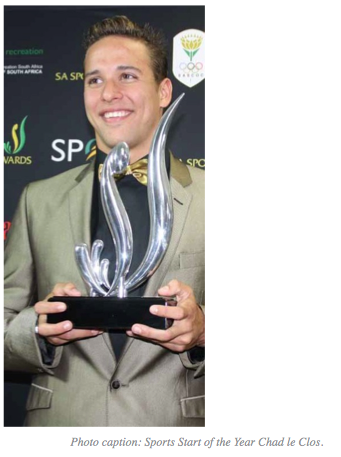Jan 2013
Jan 2013 sadmin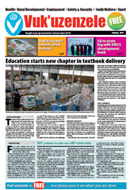
Education starts new chapter in textbook delivery
Education starts new chapter in textbook delivery sadminTextbooks will be delivered on time to schools across the country this year. This is the promise from the Department of Basic Education as it beefs up efforts to ensure that schools, especially in Limpopo, receive all textbooks before the start of the 2013 school year.
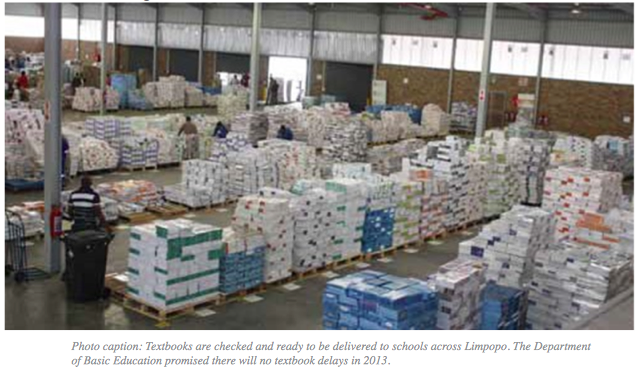 The department launched a Delivery of Learning and Teaching Support Material programme in Limpopo, the province that experienced the worst delays last year.
The department launched a Delivery of Learning and Teaching Support Material programme in Limpopo, the province that experienced the worst delays last year.
As part of the programme, all 5.5 million Curriculum and Assessment Policy Statement (CAPS) aligned textbooks were de- livered to 3 950 Limpopo primary and high schools by 30 November 2012.
All Grade four, five. six and 11 learners received textbooks and all grades also received stationery packs, thanks to National Treasury - which put up a whopping R380 million for the procurement and delivery process and R129 million for the stationery packs.
To assist with the delivery, 100 additional staff were hired and contracted to the Limpopo Department of Education.
Ensure quality
All staff were put through intensive training to ensure quality, correct picking and intensity to meet the delivery time frames. The complete door-to-door delivery plan for the textbooks was in line with the exact learner numbers; and packs of textbooks were supplied per grade, subject and language provided by the province.
All textbooks were received from the publishers and were checked within seven days to ensure that all the titles and number of books were correct and in good condition.
Schools were contacted before each delivery, which began with grade readers on 3 November and was completed by 30 November. De- liveries of leftover stock to districts and circuits for possible school top-ups were completed by 7 December.
Basic Education Minister Angie Motshekga confirmed that the department had adopted a high-tech system that allowed staff to track all phases of the delivery process. A freight management report was used to verify the delivery details of each school and a disc with individual delivery signatures was verified. “We are confident that we have done all that's necessary to ensure that all the schools have the correct books at the right time,” said Minister Motshekga.
Cost savings
By planning ahead the department saved R146 million, which is almost a 38 per cent saving on textbooks. The team managed to do this by re- questing at least three reduced quotations from the publishers per textbook, subject, language and grade. The quotations were shortlisted, inspected and then chosen.
All schools did not receive new textbooks for every subject, but were given new textbooks for the grades affected by the introduction of the tweaked CAPS in 2013.
“A textbook has a life span of three-five years, thus other grades can still use last year’s textbooks for a few years to come. Schools and parents must ensure that learners return textbooks to schools so they can be used again the following year,” said Minister Motshekga. “We will however be doing top-ups where necessary.”
HIV patients to take one ARV tablet daily
HIV patients to take one ARV tablet daily sadminFrom April patients who are on ARV treatment will no longer have to take three tablets daily but will only need one tablet a day.
This was announced by Health Minister Dr Aaron Motsoaledi recently, when he released details on a tender award for a single dose of the triple combination of tenofovir, entricitabine and efavirenz.
Dr Motsoaledi noted that South Africa had managed to reduce the cost of the tender by more than a third - 38 per cent – which is a massive saving of R2.2 billion.
The tender has been awarded to Aspen Pharmacare, Cipla Medpro and Mylan Pharmaceuticals. The price of the three- in-one combination is R89.37, which, Dr Motsoaledi says, is now the world's lowest price for this product.
“This new tender has moved from an original R8.1 billion to R5.9 billion for two years; these savings mean we can treat more patients with the same budget,” Dr Motsoaledi said.
The Minister explained that from April 2013 all HIV positive pregnant women would be given the single-dose combina- tion during pregnancy and breastfeeding, regardless of their CD4 count.
At least 80 per cent of patients who are on ARV treatment will also, from April, be able to switch to the single-dose combination. However, Dr Motsoaledi noted that those who couldn’t be switched for any reason could still take individual ARV drugs.
Highlighting the benefits of the combination for patients, Dr Motsoaledi said logistics and storage would be reduced and there would be fewer side effects.
“The fixed dose combination brings with it an additional extraordinary benefit. The combination is more effective than dual therapy and has fewer side effects for the pregnant mother, in addition to its convenient dosage regimen.”
The department will also be keeping a register of the patients so they can monitor their progress and check for side effects.
The drugs will be available in all 3 000 health facilities, said Dr Motsoaledi.
The Minister also promised that there would be no more delays in supply, as experienced in the past. Those delays were due to problems with the previous supplier.
“We have asked the suppliers to give us their commitment on this and all three of them have done so,” he said.
Clinical Advisor for TB/HIV at the Wits University's Clinical HIV Research Unit Dr Francesca Conradie said the combination would not harm the mothers with a high CD 4 count in any way.
“Simplification of the tablets is so much easier for mothers and it will lead to better results,” said Dr Conradie.
UNAIDS Country Coordinator Dr Catherine Sozi commended South Africa for making effective drugs available at a low price.
“The reduction in cost is way beyond what we've hoped for,” said Sozi
Dams, pipelines open the floodgates to water access
Dams, pipelines open the floodgates to water access sadminInfrastructure Development

Government is stepping up efforts to improve access to water and sanitation in poor regions with the roll out of a number of water pipelines and dams in several provinces.
In September last year, Cabinet agreed to include a new Strategic Integrated Project (SIP) on water and sanitation, one of 18 strategic projects as part of government’s infrastructure plan.
Minister of Environmental and Water Affairs Edna Molewa revealed in May 2012 that her department was involved with a number of projects that would benefit about 550 000 people. Already, the first phase of the Nooitgedagt Scheme – which will provide water from the Gariep Dam through the Orange-Fish-Sundays transfer scheme – is nearly complete.
A pipeline from Olifantskop reservoir site is expected to be completed by March 2013. A reservoir at the site and booster pump stations at Motherwell and Stanford Road are expected to be completed by April 2013.
The department, which received R450 million in drought relief funds from National Treasury to be used for this phase, said the completion date for the pump stations had been delayed due to long delivery and testing periods for pumping equipment.
The design and tender documentation for four more contracts, including one to construct a pump station and reservoir, have also been drafted. Depending on funding, the earliest availability of water will only be in the fi quarter of 2015.
New pipeline
Meanwhile, the first stage of the R2.1 billion Mokolo and Crocodile River (West) Water Augmentation in the Lephalale region was expected to come online by the end of 2012, when a new pipeline will be linked with the existing old one to increase carrying capacity by 37 per cent. The project has been under construction since September 2011 and the delivery of water is expected to take place this year.
This will be followed by the refurbishment of the existing old pipeline by November 2014, with the entire project to be completed by September 2015.
The project will comprise new pipelines and the incorporation, refurbishment and integration of existing infrastructure owned by Eskom and mining company Exxaro.
The second part of the project involves a transfer scheme from the Crocodile River West, near Thabazimbi to the Lephalale area to further increase water supplies to meet the needs for future additional power generation in the area, as well as associated coal mines and urban development.
Construction on this project has not yet started. The provisional cost for the second part of the project is over R10 billion.
Other projects in progress:
- The Mooi-Mgeni Transfer Scheme, which includes the construction of the over 37m high Spring Grove Dam, a pumping station and pipeline from the dam to the Mgeni River catchment, with the first delivery of water scheduled for April 2013.
- The implementation of Phase 2 of the Lesotho Highlands Water project to benefit Gauteng will go ahead after the agreement on the second phase has been ratified by South Africa. The first delivery of water is expected in 2020.
- The raising of Tzaneen Dam and construction of the Nwamitwa Dam, both on the Groot Letaba River. A notice will shortly be published in the Government Gazette announcing Minister Molewa’s intention to raise the walls and construct the new dam. The dam walls of the Hazelmere Dam and Clanwilliam Dam will also be raised.
Also underway is the R38.5 million refurbishment of eight sewage treatment plants and three water treatment plants in the Free State under the Accelerated Community Infrastructure Programme, which will benefit eight municipalities.
The department is also planning to roll out hydro-electrical power schemes projects in the Eastern Cape and KwaZulu-Natal. The projects are an initiative of the Presidential Infrastructure Coordinating Commission.
Significant progress has been made in the provision of sanitation and access to clean water since 1996.
More people getting water
The results of Census 2011, released in October last year, revealed that the number of households with access to piped water inside their dwelling or yard has risen from 61 per cent in 1996 to 73 per cent by 2011. However, almost 1.3 million households in South Africa still don’t have access to piped water, with the highest proportion of these in the Eastern Cape, KwaZulu-Natal and Limpopo.
The Census also revealed that 57 per cent of households have access to flush toilets, connected to the sewerage system – up from 52 per cent in 2001. A number of rural areas and informal settlements are still without water because of poor maintenance or operational problems at municipalities.
Minister Molewa said in August last year that about 27 per cent of rural water schemes are not operating optimally and that 24 municipalities have been targeted to improve service delivery, including the delivery of water services.
She later added that her department had provided technical assistance to four Free State towns - Senekal, Marquard, Clocolan and Ficksburg - to resolve their water crises.
To attract the right kind of skills in the water sector, the department has set up a learning academy while providing about 100 bursaries to students.
In October 2012 the department also launched the Rand Water Academy, which will officially open its doors to 130 young graduates in engineering and other fields associated with water delivery.
Water quality
The department’s 4th Blue Drop report re- leased in April 2012 shows that government is continuing to improve on drinking water quality management – with 98 municipalities last year awarded Blue Drop Status, up from 66 in 2011.
Blue Drop certification goes beyond the quality of drinking water to include aspects such as risk management, operations and asset management of water services.
Therefore it does not mean that those municipalities not awarded Blue Drop status have water that is not safe for human consumption. In August the department released its second draft of the National Water Resource Strategy which sets out the strategic direction for water resources management for the period 2013-2017.
Molewa said at the launch of the draft that South Africa continues to experience significant water quality challenges with increasing urbanisation, mining, industries and agriculture having an impact on clean water. She added that 60 per cent of the country’s 223 river ecosystems are under threat and 25 per cent are critically endangered.
The department is developing a National Water Investment Framework and Strategy to assist government roll out new water infrastructure.
More schools for Gauteng
More schools for Gauteng sadminInfrastructure development
In an effort to respond to the demands of a growing population, the Gauteng Department of Infrastructure Development intends building nine new schools in the province.
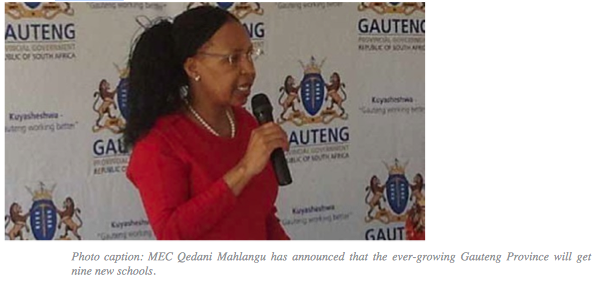 MEC for Infrastructure Development Qedani Mahlangu said the nine schools, to the value of R700 million, have been identified as part of the New Priority Schools Programme. Construction of these schools will be completed in June 2013.
MEC for Infrastructure Development Qedani Mahlangu said the nine schools, to the value of R700 million, have been identified as part of the New Priority Schools Programme. Construction of these schools will be completed in June 2013.
The new schools are Chief Albert Luthuli Primary School (Daveyton), Northriding Secondary School (Randburg), Palmridge Secondary School (Katlehong), Slovoville Primary School (Soweto) and Noordwyk Primary School (Midrand). These schools will be built by the department.
Construction of the other four schools will be managed by the Independent Development are Mamelodi Primary School (Mamelodi), Naturena Primary School (Naturena), Freedom Park Primary School (Freedom Park) and Steve Bikoville Primary (Farm Klipdrift). MEC Mahlangu issued a stern warning to all the constructors who have been contracted by the department.
“My message is resolute, I will not tolerate contractors who cut corners. The department will not tolerate mediocrity. Only contractors who have a pedigree of delivering excellent service will be afforded the opportunity to work with the department,” she said.
Contractors pledged to meet various requirements such as entering into joint ventures with smaller contractors to ensure skills transfer.
Contractors are expected to maximise the use of local resources to promote localisation. They are also required to indicate targeted job creation, in line with Expanded Public Works Programme guidelines.
Students jet off to Cuba to make their medical careers reality
Students jet off to Cuba to make their medical careers reality sadminMduduzi Mthembu’s dream of becoming a doctor seemed almost out of his grasp as the cost of his studies became too much for his family.
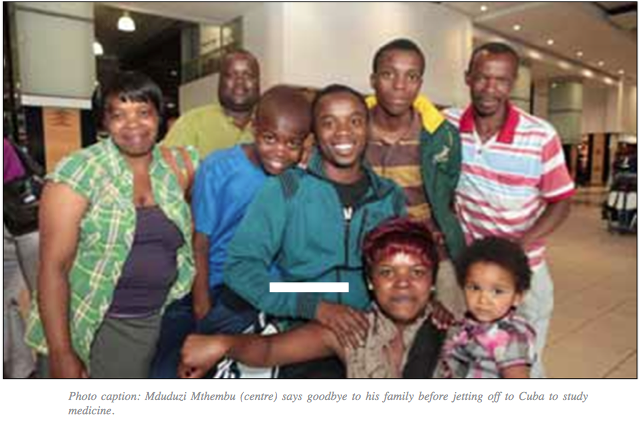 But thanks to a programme between the South African and Cuban governments, the 19-year-old from Kagiso, Gauteng was one of 99 youngsters in the province who were given bursaries to study medicine in Cuba.
But thanks to a programme between the South African and Cuban governments, the 19-year-old from Kagiso, Gauteng was one of 99 youngsters in the province who were given bursaries to study medicine in Cuba.
The group left for Cuba two months ago. The SA-Cuba partnership gives high-achieving students from poor backgrounds an opportunity to study medicine in one of the world’s most noted producers of high-calibre doctors.
“I come from a fairly humble background and it was at the beginning of last year that my dream of leaving the Midrand Graduate Institute as a qualified doctor started to seem uncertain. My family simply could not afford the costly fees any longer,” said Mthembu.
“This opportunity is a blessing from God, one that I cannot afford to let go to waste.” The second of three children, Mthembu recalled the life-changing day last July when he received the news that he was selected for the bursary.
He described his excitement, saying it felt like “a lifelong dream was unfolding and finally coming true”.
The MEC of Health in Gauteng, Hope Papo, encouraged the students to remain committed to their studies so they could return home as reputable health professionals, ready to make a difference in the health sector.
Also ecstatic about the chance to become a doctor was Welkom resident Teboho Mamaseli.
The 19-year-old was one of the 122 students selected from Free State to study medicine in Cuba.
“When I applied for this amazing opportunity, I knew my chances would be slim because there are a lot of good students in the province. But my family and I prayed and I am very excited to start my new journey,” said Mamaseli.
After completing school at the Lephola Secondary School in 2010, Mamaseli dreamt of becoming a doctor but due to financial problems he could not pursue this dream.
While studying with the help of the National Student Financial Aid Scheme, he received a bursary to study medicine in Cuba. Mamaseli also received a laptop from the Office of the Premier and said this had changed his life for the better.
“My deepest gratitude goes to our government, particularly the Free State Department of Health and the Premier for affording me this opportunity.”
He added that young people needed to believe in their dreams, rather than people’s opinions about who they are or what they can or can’t achieve.
“Impossible should never be part of your vocabulary. Muhammad Ali once said impossible is just an opinion; it is not a declaration. It’s a dare. Impossible is potential. Impossible is temporary. Impossible is nothing,” added Mamaseli.
Know your status - Get tested for HIV
Know your status - Get tested for HIV sadminWhy should I get tested?
Knowing your HIV status is the only way to protect your health and the health of your partner. Also, if you are planning a pregnancy or already pregnant, knowing your status is essential to protect the health of your child.
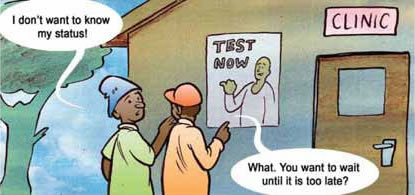 If you are HIV-positive finding out your status allows you to start treatment early and stay healthy. Those who are HIV-positive no longer have to wait until they become sick to receive treatment. Knowing if you are HIV-positive can also ensure that you do not put your sexual partner at risk of infection. You can protect your partner by taking antiretrovirals (ARVs) as prescribed and by using condoms. If you are planning a pregnancy you can use ARV treatment and other health services to prevent HIV transmission to your child.
If you are HIV-positive finding out your status allows you to start treatment early and stay healthy. Those who are HIV-positive no longer have to wait until they become sick to receive treatment. Knowing if you are HIV-positive can also ensure that you do not put your sexual partner at risk of infection. You can protect your partner by taking antiretrovirals (ARVs) as prescribed and by using condoms. If you are planning a pregnancy you can use ARV treatment and other health services to prevent HIV transmission to your child.
If you are HIV-negative, knowing your status can help you take steps to stay that way. Always use a condom. Men should also consider medical circumcision as a way to reduce the risk of HIV infection.
Private sector injects millions into public healthcare
Private sector injects millions into public healthcare sadminPrivate companies in the health sector have committed millions of rands to help government fight the scourge of HIV and AIDS, Tuberculosis (TB) and to deal with the shortage of doctors.
Clicks Holdings, Netcare, Medscheme, United Pharmaceutical Distributors (UPD), Clinics Healthcare, Litha Healthcare and Medi-Clinic have signed a three-year multi-million rand Social Compact Agreement with the Department of Health.
According to the agreement, the companies committed to contribute 0.75 per cent of their net profit after tax to the South African Joint Public Health Enhancement Fund.
The fund is expected to boost government’s effort to support post-graduate students pursuing health related studies, build additional capacity in the management of TB, HIV and AIDS and provide support to the newly established Academy for Leadership and Management in Healthcare.
Speaking at the launch, Health Minister Aaron Motsoaledi said he hoped the fund would encourage other private companies to assist government deal with the challenges facing the public health system.
“It is our hope that the launch of the Social Compact Agreement will motivate many more private healthcare companies to join the initiative and invest in health,” the Minister said.
The Social Compact Agreement is the first point in the Ten Point Programme of the department’s plan to transform the health sector.
Clicks Group CEO David Kneale said the agreement would help increase capacity in the healthcare profession. “It’s a logical step, the private sector has the funding, the expertise and resources to help re-engineer the healthcare system and we look forward to working together to build much needed capacity within the healthcare profession.”
He added that Clicks remained committed to increasing access to primary healthcare for all South Africans and would continually engage the department on innovative public-private primary healthcare models.
Medscheme CEO André Meyer said the agreement gave the private sector and government an opportunity to pool resources together for the greater good of the country.
“We believe that partnerships between the private and public healthcare sectors are absolutely crucial given the magnitude of the challenges facing the health sector. Government has also made a call, that it (government) should not take sole responsibility as it is the responsibility of all role players.”
Meyer said Medscheme wanted to be part of the transformation of the health sector. “It is crucial that the government’s vision for trans- forming the healthcare sector in South Africa is successful as it will benefit society as a whole. As a major player in the industry we have a responsibility to be part of the transformation process,” he added.
Replacing mud schools, brick by brick
Replacing mud schools, brick by brick sadminWhen President Jacob Zuma handed over the first of 49 schools built through the Accelerated School Infrastructure Development Initiative (ASIDI) in the Eastern Cape recently, he signalled government’s biggest step yet in eliminating mud schools.
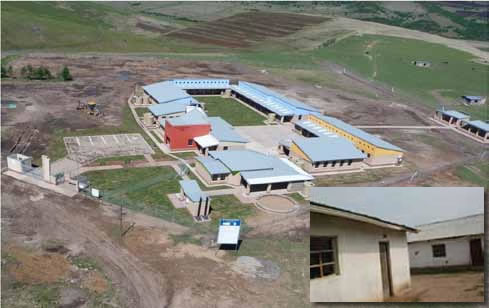 Vuk’uzenzele visited some of the newly built schools in the rural parts of Eastern Cape and spoke to school authorities about how these schools benefit communities.
Vuk’uzenzele visited some of the newly built schools in the rural parts of Eastern Cape and spoke to school authorities about how these schools benefit communities.
The ASIDI is the first programme of its kind to bring together government and private financial institutions in a deal that aims to get rid of all mud schools and inappropriate structures by 2015.
With a budget of more than R8.2 billion over the next three years, officials say the programme will replace 496 mud schools, pro- vide water and sanitation to 1 257 schools, and electricity to 878 schools. Through the ASIDI, government plans to spend R5.6 billion in the Eastern Cape alone.
Once completed, each school will have an administration block, a nutrition tuck shop, a resource centre that includes a multipurpose classroom, a multimedia centre with a library and communication facilities, a science laboratory and several classrooms.One of the problems associated with mud schools is a high dropout rate that school authorities say is evident particularly during winter when learners simply stay away from school.
At Mphathiswa Senior Primary, one of the new schools Vuk’uzenzele visited, enrolment for this year has already increased by more than 50 per cent following a drop in recent years.
Principal Pathiwe Mvelembo says the school had been flooded with applications from learners since President Zuma officially opened the new school in October last year.
It is situated in the dusty district of Libode, about 25km from Mthatha. Locals say a lack of resources had forced learners to attend classes in mud structures and under trees for many years.
The new school building has 10 modern classrooms, a computer and science laboratory, a kitchen, dedicated children's play area and a spacious administration building that also hosts the principal’s office. It’s a huge improvement from the rundown three-roomed mud structure teachers used since moving from a nearby church building more than 10 years ago.
“We feel right now things are going to change. We are very fortunate because now that we have a new structure, learners are going to gather in big numbers here because we are going to meet the needs of today, particularly with technology,” says Mvelembo.
It’s a view shared across the province where the ASIDI schools are being introduced.
“We are very happy with the new structures because they are permanent. Mud structures were making conditions very bad. This is a rural school and our financial position as a community would not allow us to build a new school for our children,” says Roney Nombanga, principal at Tabata Senior Primary School, another ASIDI school.
Both schools have received 27 laptops for their computer laboratories where learners will be taught basic computer skills.
The provincial education department says there were 939 mud structure schools in the Eastern Cape in 2003/04. It dropped to 436 by 2008/09, and then to 395 by the start of the ASIDI programme, which identified the need for over 3 000 classrooms.
A school infrastructure report by the national Department of Education also points to an improving school infrastructure situation.
Out of 24 793 schools, about 21 249 have a supply of electricity, 22 391 have a supply of water and 23 522 have fencing that includes wire, palisade or brick. More than 5 252 schools have libraries, 3 772 have laboratories, while 5756 have computer centres and 17 per cent of schools have sports facilities.
Govt takes FET college investment further with big money
Govt takes FET college investment further with big money sadminThe Department of Higher Education and Training has set itself a target of registering one million students at Further Education and Training (FET) colleges this year and four million students at other non-university tertiary institutions by 2030.
Speaking at the launch of the FET Turnaround Strategy, Minister of Higher Education and Training Blade Nzimande said FET colleges should play a role in improving the levels of education, especially among young people, and also contribute to the country’s economy.
“FET colleges must claim their rightful place in contributing to driving the country’s economy, thereby reducing unemployment, especially among the youth. We are turning our FET Colleges into institutions of choice,” he said.
The department launched the turnaround strategy to deal with the challenges faced by FET colleges, which includes low graduate rates, the lacking qualifications of lecturers, poor financial management systems and the colleges’ ability to manage reliable examinations.
“The intention is to systematically address key challenges these institutions have been faced with over the years, to achieve sustain- able improvements in the quality of teaching and learning,” explained Minister Nzimande. Government has taken a keen interest in improving FET colleges, boosting its financial support for the colleges over the past few years.
The additional funding has resulted in increased enrolment at the 50 FET colleges across the country.
“Support to colleges has grown significantly over the last three years. State funding has increased from R3.8 billion in 2010 to R4.8 billion in 2012, representing a 26 per cent increase,” Minister Nzimande added.
Access to higher education and training for students who excel in their studies has also seen an increase.
Allocations for FET college bursaries grew from R318 million in 2010 to R1.75 billion in 2012, representing an increase of 440 per cent. Minister Nzimande said that while funding would remain a key priority for the department, it would also be closely tied to outputs.
Workbooks to make learning a breeze
Workbooks to make learning a breeze sadminThe Department of Basic Education has committed itself to improving the literacy and numeracy skills of all learners. To achieve this the department has produced a series of workbooks to assist learners. This year the department will distribute 54 million workbooks to learners.
What are workbooks?
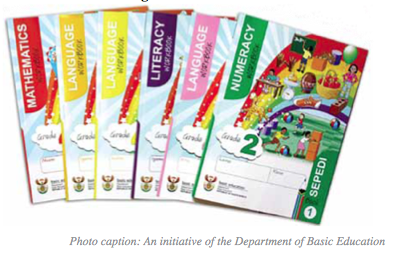 Each workbook is made up of 128 easy-to- follow worksheets for listening, reading and writing skills. The workbooks are organised into four worksheets per week, divided over eight weeks per term.
Each workbook is made up of 128 easy-to- follow worksheets for listening, reading and writing skills. The workbooks are organised into four worksheets per week, divided over eight weeks per term.
All workbooks comply with the latest Curriculum Assessment Policy Statement (CAPS). Each year a learner will get two workbooks for each subject. Workbook 1 will be used from January to June and Workbook 2 from June to December.
Workbooks are distributed free of charge to learners in Grades R to nine. Grade R learners will receive four books per year.
What is the point of workbooks?
They provide every learner with worksheets to practice the language and numeracy skills they have been taught in class. Workbooks are also meant to help teachers track the progress of learners and provide extra support if needed.
They are a simple way to structure learning activities for learners. Each child will own the workbooks. This means they can take them home and write in them.
Do workbooks replace textbooks?
No. Workbooks are meant to be used with textbooks. They save the teacher from writing exercises and preparing their own worksheets.
The following workbooks will be available in 2013:
Grade R: One integrated book per term, which will include language, mathematics and life skills. The books will be distributed in all 11 official languages.
Home Languages: Grades 1 - 6 will receive two workbooks, which will be available in all 11 official languages.
First Additional Language: Grades 1 - 6 will receive two workbooks, which will be avail- able in English and Afrikaans only.
Mathematics: Grades 1 - 3 will receive two workbooks, which will be available in all 11 official languages.
Mathematics: Grades 4 - 9 will receive two workbooks in English only, with Afrikaans available on the department’s website.
Life Skills: Grades 1 - 3 will receive two workbooks, which will be available in all 11 official languages.
Natural Science and Technology: Grades 4 - 6 will receive two workbooks, which will be available in English and Afrikaans only.
All workbooks will also be available in Braille and large print for the visually challenged.
Principals are urged to check that the work- books they receive are of the correct quantity, in the correct languages and not damaged. Principals must report any errors to the call centre on 086 100 4357 or SMS 39864 (free).
To ensure all schools have access to work- books throughout the year, they have been loaded on the department’s website at www.education.gov.za and are available for free download.
Clean water joy for Mpumalanga villagers
Clean water joy for Mpumalanga villagers sadminGone are the days when 69-year-old Hamilton Makgato and his family would gather every container and chase after a water tanker or walk for hours to the nearest borehole or river for water. Now all they have to do is open up a tap in their home and water gushes out - making life so much easier for the family.
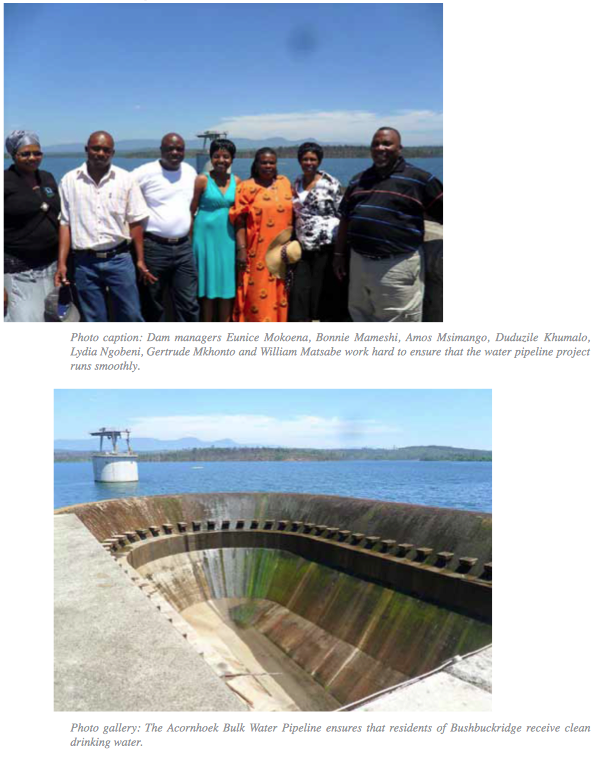 Makgato lives with his wife, aunt, two children and three grandchildren in the Shatale village in Bushbuckridge, Mpumalanga. “I used to buy water for my family to drink, cook and bath with. It was so heavy to carry but it had to be done. Now I am so happy because we have a tap in our home,” said an overjoyed Makgato.
Makgato lives with his wife, aunt, two children and three grandchildren in the Shatale village in Bushbuckridge, Mpumalanga. “I used to buy water for my family to drink, cook and bath with. It was so heavy to carry but it had to be done. Now I am so happy because we have a tap in our home,” said an overjoyed Makgato.
The Makgato family are among the more than 264 000 Bushbuckridge residents from villages in Relani, Shatale, Orinico, Casteel, Craigeburn, Tsakani and Acornhoek who will now receive clean, filtered water every day, thanks to the Acornhoek Bulk Water Pipeline Project.
According to the Executive Mayor of Bushbuckridge Local Municipality, Renias Khumalo, the municipality started the project after a severe drought hit the area in 1995. Due to the water shortage, the municipality decided to build the Inyaka Dam and construct the Inyaka Water Treatment Works. However, poor workmanship and quality of materials meant that the pipeline collapsed.
To keep the project afloat, the provincial Department of Water Affairs, through the Regional Bulk Infrastructure Programme, took over the maintenance in January 2010 and injected a whopping R140 million into the project.
The Bushbuckridge Local Municipality is one of the few municipalities in Mpumalanga with huge water supply backlogs. To remedy this, three main bulk supply pipelines have been created. The pipelines that connect to the Marite community in the south east and the Hluvukani community in the north east of Bushbuckridge have been completed and are fully operational. The Dwarsloop to Acornhoek bulk pipeline is the final project to supply water to communities in the north west.
Challenges
The project has encountered challenges that have delayed progress. These include heavy rain and floods in the region in January 2011, community uprisings over service delivery, emergency repairs to reservoirs and repairs to leakages on the pipeline.
To date, residents from the Relani, Shatale, Orinico, Violetbank and Casteel villages are able to receive water from the pipeline. The Craigeburn village is expected to start receiving water by 31 January, the Tsakani village by 28 February and Acornhoek villagers will receive their bulk water supply from March this year.
Treatment
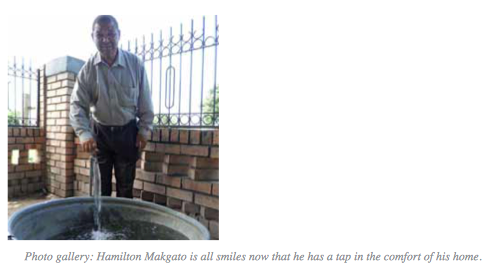 Villagers will now get clear, filtered and treated water from the pipeline and will not have to rely on dirty, disease-ridden river water. To ensure the water is processed properly, the water from the Inyaka Dam is sent to the Inyaka Water Treatment Works at the Bushbuckridge Water Board. Here the water undergoes a strict process of filtration, disinfection, treatment and waste water is disposed. Once all the impurities have been removed, the water is then sent via the pipeline from the treatment works to the villages and is ready for consumption.
Villagers will now get clear, filtered and treated water from the pipeline and will not have to rely on dirty, disease-ridden river water. To ensure the water is processed properly, the water from the Inyaka Dam is sent to the Inyaka Water Treatment Works at the Bushbuckridge Water Board. Here the water undergoes a strict process of filtration, disinfection, treatment and waste water is disposed. Once all the impurities have been removed, the water is then sent via the pipeline from the treatment works to the villages and is ready for consumption.
The clean water will also help rid the com- munities of health related problems such as diarrhoea and cholera, which are caused by drinking river water that has not been purified.
Sarah Mogakane, the regional manager of the Shatale municipality, said residents were overjoyed to finally receive a stable supply of clean water. “Previously, the municipality could only send out water tankers once or twice a week and the water was not enough to supply all the households. This left the communities no choice but to use river water. Now the pipeline has made a huge impact on the lives of our people. It has changed their lives for the better,” she added.
The bulk infrastructure pipeline will provide water to more than 264 000 people. This includes:
- 10 130 residents in Relani
- 38 410 in Shatale
- 7 468 in Orinico
- 45 771 in Casteel
- 24 273 in Craigeburn
- 38 375 in Tsakani
- 85 194 in Acornhoek.
For more information contact the Department of Water Affairs on 012 336 6696.
Govt helps youngsters cultivate business success
Govt helps youngsters cultivate business success sadminThe Department of Rural Development and Land Reform has injected a massive R15.7 million into an agricultural cooperative formed by a group of young people from Jericho in the North West. Bana Ba Kgwale Agricultural Primary Cooperative was started by 25 young people who wanted to get involved in farming, supply local communities with the produce and create job opportunities for their counterparts in the village.
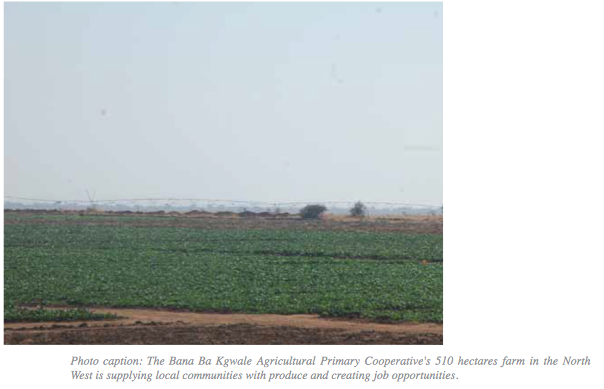 The cash injection from the department comes as part of its Recapitalisation and Development Programme that aims to provide interventions to distressed and newly acquired farms.
The cash injection from the department comes as part of its Recapitalisation and Development Programme that aims to provide interventions to distressed and newly acquired farms.
Chairman of the cooperative Jacob Maiketso said it was registered with the Department of Trade and Industry in 2008.
“Since then the project never looked back and has created a number of job opportunities, from production stream to packaging and cleaning. So far 133 jobs have been created,” said Maiketso.
The 510 hectares farm is on the tribal land of the Bakwena Ba Mogopa Traditional Authority. The traditional authority allocated the land to Bana Ba Kgwale through a lease agreement for nine and half years.
The money from the department was used for the connection of Eskom power lines to the farm, fencing, water tanks and stands, building a 200 square metre ablution block, a 2 508 square metre pack house and office, as well as a borehole pump.
The money was also used to buy farming implements, fertilisers, seeds, for labour, insurance, fuel and other activities on the farm.
The cooperative supplies chain supermarket Pick n Pay with cabbages, spinach, carrots and butternuts.
As a form of giving back to the community, the Bana Ba Kgwale Cooperative also donates fresh vegetables to poor households and to the Maboloka HIV/AIDS Hospice Centre Project in the Maboloka village just outside Jericho.
The Bana Ba Kgwale Agricultural Primary Cooperative is a prime example of how rural communities can transform the rural economy and convert projects into enterprises with government’s help.
*King Mthombeni works for the Department of Rural Development and Reform.
For more information contact the Department of Rural Development and Land Reform on 0800 007 095.
Take action to stop abuse
Take action to stop abuse sadminFor most South Africans, the start of a new year begins with reflecting on fun-filled, relaxing holidays and time with families.
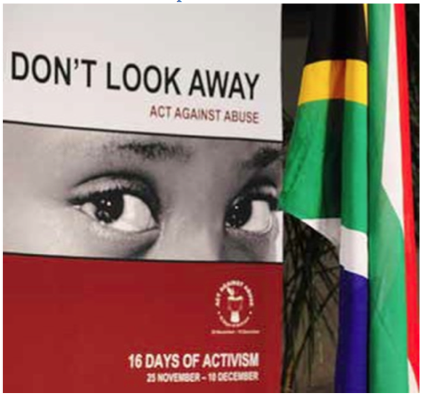 But, for other citizens, the festive season is anything but festive, as they fall victim to abuse at home, which should be the safest place on earth.
But, for other citizens, the festive season is anything but festive, as they fall victim to abuse at home, which should be the safest place on earth.
However, help is at hand. If you are in an abusive relationship or a child in your care is being abused, you can take steps to protect yourself or the child by approaching the courts. The Domestic Violence Act gives victims of domestic violence the maximum protection the law can provide.
If you or someone in your care is being abused, you can get a protection order from court against the person responsible for the abuse.
Domestic violence occurs when you are subjected to:
- Physical abuse: for example, when you are assaulted or threatened with violence.
- Sexual abuse: for example, when you are raped or forced to perform or watch humiliating sexual acts.
- Emotional, verbal and psychological abuse: for example, when you are subjected to constant insults, ridicule or name-calling.
- Economic abuse: for example, when you are prevented from earning an income.
- Intimidation: for example, if you receive threatening and fearful messages or SMSes.
- Harassment: for example, when you repeatedly receive phone calls or are being constantly watched and this causes you to be afraid.
- Stalking: for example, when your abuser repeatedly follows you or demands to talk to you against your will.
- Damage to property: for example, when your abuser intentionally damages your property without your consent.
- Any other controlling or abusive behaviour that may cause harm to your safety, health or well-being.
The person abusing you can be any one you have a domestic relationship with by blood, marriage or adoption. This includes your spouse, live-in partner, adoptive parent or child, housemate or family member.
It may also be someone you used to date or you were engaged to.
If you are a victim of domestic violence go to the clerk of the court at your nearest magistrate’s court to obtain a protection order.
A protection order will prevent your abuser from repeating the attack against you.
If the act of domestic violence amounts to a crime, you can lay a charge at the nearest police station.
Acts of abuse which are also crimes include common assault, assault with the intention of doing grievous bodily harm, indecent assault, rape, incest, attempted murder, malicious damage to property, pointing a firearm and abuse of animals.
By asking for a protection order you are not laying a criminal charge. You do not need to lay a criminal charge to get a protection order. Once you have the protection order, it is a crime for your abuser to break the conditions of it and the person can be charged with contempt of court if they do so.
If the breach involves a crime such as assault, then the person can be charged with both contempt of court and assault.
Being in possession of a protection order means having the power to have your abuser arrested as soon as that person commits an act of abuse against you.
All you need to do is report that the abuser has breached the conditions of the protection order and police will act immediately.
A protection order can be obtained from a magistrate’s court in your area or the area where the abusive person lives.
You may go during court hours, after hours and even on weekends if it is urgent. You will need to fi out an application form for the order. If you need help to do so, a clerk of the court will be able to assist.
Your application will then be taken to the magistrate who will prepare a notice that will be served on the abusive party. There will also be a date requesting the person to come to court for a hearing. A sheriff of the court will deliver the order to the abusive party.
A protection order is a powerful document that gives you protection against abusive behaviours or acts of domestic violence. It even goes as far as offering protection to extended members of the family.
Should there be a breach of any one of the conditions set out in the protection order, it may result in the offender being sent to prison for up to five years or being fined.
If you are being abused call:
- Police on 10111
- Childline on 0800 055555
- Stop Women Abuse Hotline on 0800 150 150
- Lifeline on 0861 322 322 or (021) 461 1111.
Learning to police the smart way
Learning to police the smart way sadminThings have just gotten worse for criminals and better for law-abiding South Africans as police officers acquire more skills to help them detect and prevent crime.
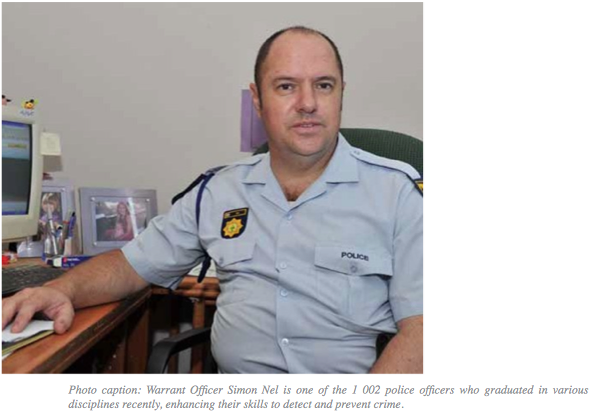 Recently, 1 002 officers graduated in different disciplines, enhancing their ability to combat crime.
Recently, 1 002 officers graduated in different disciplines, enhancing their ability to combat crime.
This included 331 who qualified as detectives and 84 who graduated through the Recognition of Prior Learning (RPL) Programme.
Others qualified in fields such as human resource management, public administration and forensic sciences.
The graduation ceremony was held at the Tshwane Academy in Pretoria West.
During his budget speech, Police Minister Nathi Mthethwa declared 2012 as the year of detectives. He said this was in line with government’s five key priorities that include the safety of citizens.
One of the new graduates, Warrant Officer Simon Nel, is one of those who will be training detectives.
He received a National Diploma in Occupationally Directed Education Training and Development Practices (ODETDP).
Nel, who is based at the Hammanskraal Detective Academy, said education had no limits.
After practising as a detective for 10 years, he turned his focus to educating and training budding detectives.
“I would not be in the division of training if I did not believe in ongoing education. Every single day you learn something new. I would encourage police to upskill and improve to benefit themselves and the clients they serve,” Nel said.
He also emphasised the importance of a positive attitude.
“You can have knowledge and skills but without the right attitude it is meaningless.” Nel started studying towards his Diploma in ODETDP in 2006 and studied in intervals before completing it.
He also has an Honours degree in Policing, Certificate in Money Laundering and Commercial Crime Control, and a Diploma in Human Resource.
He explained that a detective’s role was to react when a crime was committed. A detective’s core functions included investigating how a crime was committed, who committed it and reporting to the court.
Being a detective requires a lot of dedication, commitment, self-respect and pride. “You need to continue to work even when no one is watching,” Nel said.
National Police Commissioner General Riah Phiyega also stressed the importance of learning, saying it should become a way of life. “331 detectives are graduating for the first time, 84 detectives are graduating through RPL. The rest come from the Detective Programme run at Graaff Reinet. This is a real indication that 2012 is the year of detectives,” she added.
Commissioner Phiyega was confident that graduates would display a culture of service delivery, driven by quality and client satisfaction.
“They will be dedicated, committed and loyal to the SAPS as an employer of choice. Their knowledge and experience will benefit the country as a whole in crime fighting,” she said.
Gauteng plant gears up locals to assemble taxis
Gauteng plant gears up locals to assemble taxis sadminA group of students gather around a table stacked with car parts, listening to a Chinese engineer instructing them on how to assemble a vehicle.
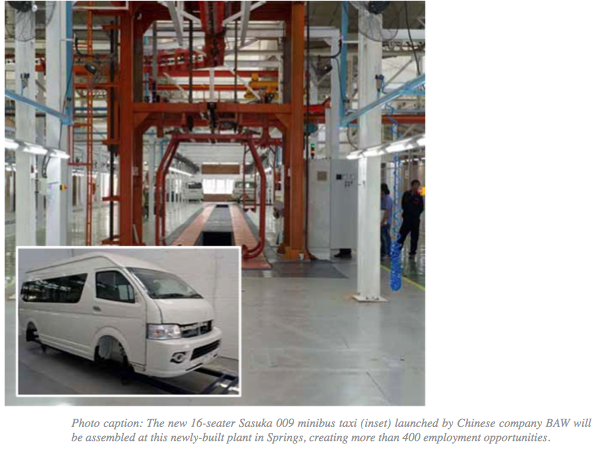 This is the scene at the Beijing Automobile Works (BAW) workshop in Springs, Gauteng where the first recruits are being trained by the Chinese company to assemble the new Sasuka minibus taxis.
This is the scene at the Beijing Automobile Works (BAW) workshop in Springs, Gauteng where the first recruits are being trained by the Chinese company to assemble the new Sasuka minibus taxis.
The 11 students surrounding the table piled with car parts including a steering wheel, engine and exhaust pipes, are the first to undergo on-the-job training in assembling parts onto the 16-seater Sasuka 009.
The minibus is designed and developed by BAW under its international brand.
Following an agreement between BAW and the Industrial Development Corporation (IDC), BAW has set up this assembly plant in South Africa. The plan is for these minibuses, which look like Toyota Quantum vehicles, to be manufactured locally in future.
The IDC has invested R22.9 million in the project.
The company will hire 80 more people this month. When it reaches full capacity, the company will have 400 people on its payroll.
Malibongwe Godla, 41, is part of the fi t group to be trained.
“I am very happy that I got a job. What I like most about it is that I am being trained and receiving skills on how to fit parts onto a car. This will grow my own skills and even if I decide to leave the company, I can still survive on my own because I have the necessary mechanical skills,” he said.
Being employed by BAW has restored Godla’s dignity, as he is now able to provide for his family. He is proud of the skills he has gained.
“I now know the different types of equipment for fi parts onto cars. I can also identify the parts and know how each equipment makes the car function better,” he said, while pointing at the engine, side mirrors and exhaust.
The plant was officially opened by Minister of Economic Development Ebrahim Patel two months ago.
The BAW and IDC project falls under a Department of Trade and Industry programme aimed at developing the local bus, truck and minibus industry, which started in 2010.
Since 2007, South Africa has not manufactured any of the minibus taxis that the public uses daily, Patel said.
“South Africa’s entire annual demand of 22 000 to 23 000 minibus taxis was imported. As this annual demand is expected to increase to about 28 000 by 2015, the level of imports of minibus taxis would have increased sharply in the next few years. In the space of a few months, this is changing,” he added.
Toyota also opened a taxi assembly line in Prospecton, Durban in April 2012, the Minister said.
“The result will be that about two-thirds of the annual demand for taxis will be assembled in South Africa from next year. This is a solid achievement over a short period. We see the assembly of taxis as a step towards full localisation and manufacture of taxis in South Africa.”
The project will not only supply the South African market but will also create export opportunities for the rest of Africa.
“While there are about 200 000 taxis on the road in South Africa, it is estimated that there are a further 100 000 in the rest of Southern Africa. About 50 per cent of the annual demand is in South Africa. The total project investment is estimated at R196 million from all shareholders,” Minister Patel said.
The Sasuka minibuses arrive from China in a container with the body intact. The plant in Springs then fits other parts onto the vehicle. “We want to train the students the proper way. We want to train them for as long as they need training,” said Gerald Brookshaw, BAW’s manager in product and quality.
The Sasuka minibuses will be available at dealerships across the country from February. The recruitment process selecting those to work and train at the plant is being done with the Department of Labour.
For more information contact the department’s offices in Springs on 011 898 3340 and Boksburg on 011 365 3700.
Ex-offenders make their mark in business
Ex-offenders make their mark in business sadminFour former prisoners from Tsakane, Gauteng have risen against the odds to grab their second chance in life. Veli Sefali, Salamina Molakeng, Syd- ney Kodijang and Jane Ngama have teamed up with three community members to set up a cooperative.
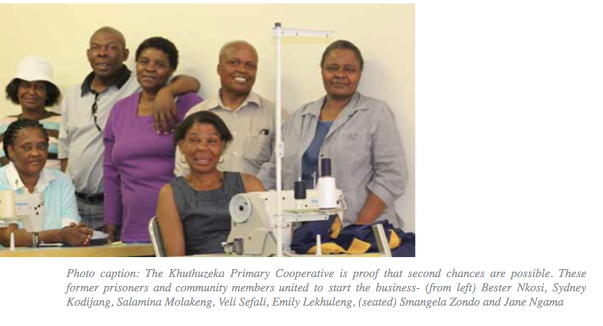 The Khuthuzeka Primary Cooperative, which was officially registered in 2010, produces bed linen, artwork, upholstery, African beadwork and school uniforms.
The Khuthuzeka Primary Cooperative, which was officially registered in 2010, produces bed linen, artwork, upholstery, African beadwork and school uniforms.
Sefali initiated the business after his release from prison in 2009.
He was convicted of conspiracy to commit robbery. After spending seven years behind bars, Sefali successfully appealed his sentence and was released.
Molakeng served a 11 month sentence for fraud and was released in 2000.
Kodijang left prison in 2009 after serving 10 years for robbery, while Ngama tasted freedom in 2003 after serving a four year prison term for fraud.
The four teamed up with Emily Lekhuleng, Bester Nkosi and Smangela Zondo - members of the Tsakane Community.
Lekhuleng, Nkosi and Zondo were already sewing at the time, specialising in linen.
While at the Makhado Correctional Services in Limpopo, Sefali learnt skills such as wood-teaching artwork.
After his release, he got help from the Com- munity Corrections Forum, a forum created by the Department of Correctional Services to teach former prisoners how to start their own businesses and make a living outside prison.
The cooperative has now secured a contract with the Ekurhuleni Metropolitan Municipality to make uniforms for local schools. Gauteng Enterprise Propeller has also assisted the group by giving them five sewing machines.
The group sells most of its goods at flea markets and to the community.
While Lekhuleng, Nkosi and Zondo manufacture the bedding, Molakeng focuses on artwork, Kodijang specialises in upholstery and Ngama does the sewing.
“We all have different skills and we are teaching each other. This makes the manufacturing process faster,” said Lukhuleng.
They all have big dreams for the cooperative.
“We would like to see the business competing with big companies like Pres Les and HomeChoice,” said Zondo.
Sefali’s aim is for the business to grow so that it can to employ more community members. All those involved in the cooperative recognise the need for ex-offenders to be welcomed back into society.
Lukhuleng said it was important to give former prisoners a second chance. The cooperative is proof of what can be achieved when that second chance is offered, she pointed out. Kodijang, who has a passion for teaching, also wants to share the skills he learnt in prison with young people.
The group have also registered a non-governmental organisation called Active Mzansi, which teaches young people about the dangers of drugs, alcohol and crime. It also offers career guidance.
“We also want to tell other ex-offenders about how they can start their own businesses. People leave jail with skills but struggle to find a job because of their criminal record. In other cases people struggle to accept ex- offenders back into the community. We also provide guidance on this,” Sefali said.
Municipal employees hit the books to improve skills
Municipal employees hit the books to improve skills sadminIn March 2012, Pearl Zulu completed a course in municipal finance as part of her internship with the Richards Bay Municipality in KwaZulu-Natal.
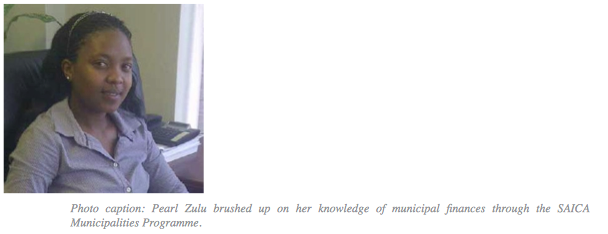 “The training has given me a chance to learn how local government works. The first three months of the programme focused on work- place readiness. Some of the modules covered were supply chain management, basic business English and reporting. The programme has a logical training sequence that builds skills,” said Zulu.
“The training has given me a chance to learn how local government works. The first three months of the programme focused on work- place readiness. Some of the modules covered were supply chain management, basic business English and reporting. The programme has a logical training sequence that builds skills,” said Zulu.
She was one of the 1 500 interns recruited by National Treasury and placed at municipalities to undergo 15 months of training.
Zulu, who has a Diploma in Internal Auditing from the Durban University of Technology, is proud of her new skills.
“I am now able to design system description, perform audits…and do risk assessments. I also understand the Municipal Finance Management Act better.”
The SAICA Municipalities Programme is funded by the National Skills Fund of the Department of Higher Education and Training to the tune of R72 million. National Treasury, the South African Institute of Chartered Account- ants (SAICA) and Deloitte Learning Alliance, which conducts training, are all part of the project.
The programme offers on-the-job training to improve the skills and legal compliance of municipal finance officials and in so doing enhance service delivery.
Apart from training for interns, there are modules for chief financial officers, financial managers and financial clerks.
The programme aims to improve the skills and competencies of officials currently employed by municipalities, enable officials to meet the minimum competency requirements and increase capacity in municipalities.
During his 2011/12 budget speech, Minister of Cooperative Governance and Traditional Af- fairs Richard Baloyi identified governance and financial management as some of the factors hampering service delivery in municipalities. General manager of the programme Natalie Zimmelman of SAICA said municipalities that wanted to be involved in the programme approached SAICA for assistance.
“They submit a list of people that need to at- tend the programme and it is up to the students whether they attend. We don’t determine the strategy, government develops it. Our job is to implement it working together with National Treasury and its provincial structures,” Zimmelman explained.
Students need to compile a portfolio for the duration of the course. They are also helped along by mentors who visit their districts to assist students with case studies and exercises. National Treasury has a database of unemployed graduates who are recruited as interns and sent to the municipalities.
Zimmelman said some of the factors that contributed to skills shortage at municipalities were unified vacancies, budget constraints and not enough staff in rural areas.
She added that the programme was scheduled according the needs of the municipality.
For more information on the National Treasury Graduate Development Programme visit the website at www.treasury.gov.za or contact SAICA on 08610 72422 or email: saica@saica.co.za
Hydroponic project tackles poverty in Walmer
Hydroponic project tackles poverty in Walmer sadminResidents of Walmer in the Eastern Cape have rolled up their sleeves and taken the fight against poverty into their own hands.
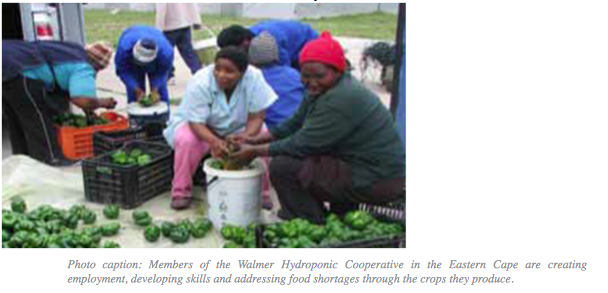 In 2006 Zanemvula Tyokwana and nine others started the Walmer Hydroponic Cooperative and formally registered it in 2007. The aim was to address food shortages, create employment and provide agricultural skills to the many unskilled young people in the area.
In 2006 Zanemvula Tyokwana and nine others started the Walmer Hydroponic Cooperative and formally registered it in 2007. The aim was to address food shortages, create employment and provide agricultural skills to the many unskilled young people in the area.
Hydroponics is a method used to produce crop that doesn’t require soil to plant. The project produces baby marrow, patty pan, peppers and tomatoes. These are sold to Fruit & Veg, Spar, restaurants, shops in the area and the public.
The Nelson Mandela Bay Municipality lent a hand by building tunnels, which act as a greenhouse protecting the crops from the weather. The municipality also provided the group with farming tools.
Thina Sinako, a non-governmental organisation that supports cooperatives, also made a contribution by building an office with a boardroom, cool rooms and sponsoring two bakkies.
So far the project has created 12 permanent jobs for community members. In 2011 the project trained 50 local youth in crop management.
Students from Nelson Mandela Metropolitan University have also joined the project as interns. The students assist with marketing and administration work and have proved to be a great asset to the project.
* Portia Mlisa works for GCIS in Nelson Mandela Bay.
State funding takes small businesses to new heights
State funding takes small businesses to new heights sadminIn 2005 retired school principal Boy John Mokoena and his wife Eunice ran a thriving business, providing high quality interior and exterior gamazine wall coating to properties in and around Nelspruit. Business was good but they needed help to grow and service their ever-increasing clientele.
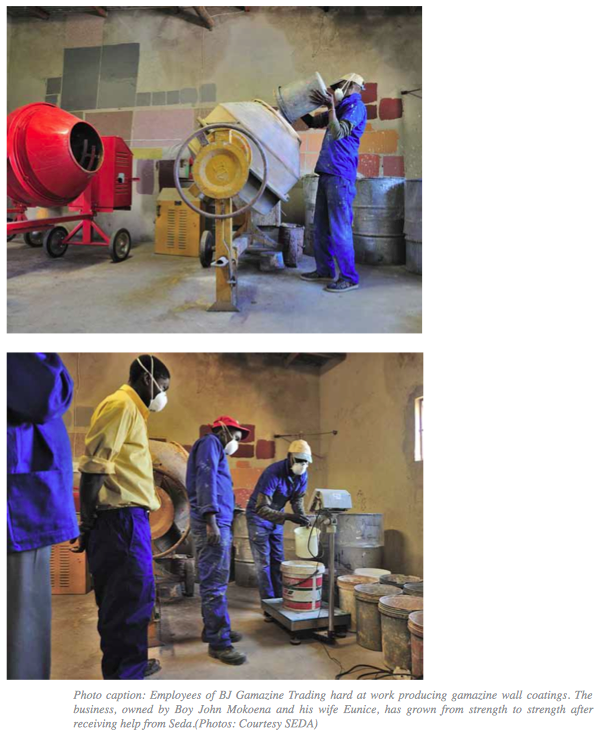 With help from the Small Enterprise Development Agency (Seda), the couple was able to double their gamazine coating business’ turnover in just one year. Seda gave BJ Gamazine Trading support and business training in financial, marketing, operations and human-resources (HR) management.
With help from the Small Enterprise Development Agency (Seda), the couple was able to double their gamazine coating business’ turnover in just one year. Seda gave BJ Gamazine Trading support and business training in financial, marketing, operations and human-resources (HR) management.
Seda also helped the Nelspruit business to receive ISO 9000: 2008 training. This is training on quality management systems designed by the International Organisation for Standardisation to help organisations ensure that they meet the needs of their customers. The agency also assisted them to attend various trade shows.
Exporting to Senegal
Today the couple supplies property owners and construction firms across the region including Equatorial Guinea and Senegal. They employ 26 people and are training 60 others to meet contract orders.
The Mokoenas are among 15 391 business owners and would-be entrepreneurs that Seda assisted in the last financial year, while 1 845 entrepreneurs received support from the agency’s 32 incubators.
Thousands more were assisted by other government agencies, which directed millions of rands to small businesses last year in the form of loans, grants and non-financial support. These include 1 718 entrepreneurs assisted by the Technology Innovation Agency (TIA) through its 13 technology stations, three tooling stations and 15 platforms. Also, 2 276 youth received business consultancy vouchers and business opportunities support from the National Youth Development Agency (NYDA). A further 1 578 youth received mentorship and 17 288 attended entrepreneurship awareness programmes.
Funding small business
National government agencies including Khula Enterprises, the National Empowerment Fund (NEF), the SA Micro-fiinance Apex Fund (Samaf) and the NYDA in 2011/12 granted more than 73 000 micro loans and loans worth over R272 million to small and micro enterprises, most of them black-owned firms.
Over 2 400 small, medium and micro enterprises also received more than R586.6 million in grants from the Department of Trade and Indus- try to help them with exporting and marketing, as well as research and development (R&D) and improving their manufacturing practices. Millions more in finance was channelled to small businesses through the Industrial Development Corporation (IDC), as well as the development finance institutions of various provincial governments.
When it comes to finance, Khula, the NEF and the NYDA together lent R200.5 million to small businesses, while R71.6 million from Samaf and the NYDA went to micro enterprises.
In April, Samaf and Khula merged to form the Small Enterprise Funding Agency (Sefa) which falls under the IDC. The NEF’s Imbewu Fund, which lends to black-owned small businesses disbursed R105 million to 40 small businesses. The Imbewu Fund has allocated R50 million to help fund black entrepreneurs looking to acquire Engen Service Stations. This will help lift the number of black-owned outlets from 39 per cent to 45 per cent by 2016.
Over the last five years, the NEF also spent R14.7 million on mentorship support to beneficiaries, including R3 million in 2011/12. During the last financial year, the NEF also opened six regional offices to advance its national footprint and will open two more – in the Northern Cape and the North West - in the current financial year.
Creating jobs
Khula, which lends mostly through banks and retail finance intermediaries, which then lend on to small businesses, disbursed 1 617 loans to the value of R84.7 million to small enterprises, which helped create 2 118 jobs. In all, 82 per cent of finance went to black-owned businesses.
Last year, the agency launched pilots for its Khula Direct model in Pretoria, East London and Cape Town. Many are concerned that lending directly to small businesses might push up the number of impairments – reducing the company’s stated capital. They argue that financial organisations and banks are more geared to lending, but as of the end of 2011, collections were at 98 per cent, while as at 31 March 2012 there were no write-offs.
Samaf lent R45.6 million – the highest ever – to its network of 16 micro finance institutions and 29 financial service cooperatives, which in turn lent out 62 459 loans. In all, 93 per cent of these loans went to micro entrepreneurs, while the remainder went to individuals for housing improvement and education support needs.
Two thirds of the beneficiaries were rural women, while a further 25 per cent were urban women. In all, the loans helped create 48 000 jobs.
The NYDA lent R36.8 million to business owners – including 9 899 loans totaling R26 million to micro entrepreneurs. This money helped create 9 304 jobs and a further R10.8 million to 14 small businesses, which helped create 68 jobs.
Grants
The Department of Trade and Industry’s incentive and innovation grants include:
- 896 enterprises which benefited from R69 million in Export Market Incentive Assistance grants, which helped support R6.42 billion in export sales.
- 299 black businesses benefited from R51.1 million in the Black Business Supplier Development Programme grants to help black business owners with marketing and management support.
- 183 cooperatives received R49 million in Cooperative Incentive Scheme grants to assist cooperatives to buy machinery or equipment.
- 648 small- and medium-sized manufacturing firms and 158 small firms in the tourism sector accessed the Enterprise Incentive Programme. The grants valued at R251.5 million are expected to help manufacturing firms create over 15 000 jobs and the tourism enterprises a further 1 700.
- 191 small firms received R93 million in research grants through the Technology and Human Resources for Industry Programme, which allows businesses access research funding by partnering with universities. Most of the projects were in the agriculture, information and communication technology and chemicals sectors.
- 52 businesses, mostly small firms were able to access grants to assist them in R&D totaling R73 million, through the Support Programme for Industrial Innovation, which is administered by the IDC. Most of the projects were in manufacturing, software and mechanical machinery.
Non-financial assistance
Government also provided millions of rands worth of non-financial support – such as business training and mentoring – to business owners in the last financial year.
While the NEF, Khula, municipalities, metros and provincial and national government departments all provide non-financial support to small business owners, the bulk was disbursed by Seda, the NYDA and TIA.
In the last financial year, 79 570 people visited Seda’s 42 branches – up 24 per cent from the 63 916 in 2010/11. Of these Seda is working with 15 391 clients.
The Department of Trade and Industry is on a drive to create new incubators and in recently launched the Incubation Support Programme, which is intended to encourage private sector partnerships with government to foster collaboration between small and big businesses.
Seda aims to increase its number of incubators from the present 32 to 42 by the end of 2012/2013.
Meanwhile, as of 31 March 2012, Seda’s SMME Payment Assistance Hotline has helped to facilitate over R300 million in payments from government departments, entities and municipalities since its launch in September 2009 and R59.5 million was recovered in 2011/12.
The agency’s Seda Stars business plan competition attracted more than 5 500 entrants, while 936 people were provided with training on national and international standards and 129 were given productivity testing support.
Interesting details of Seda’s clients include:
- A total of 56 per cent of Seda clients saw their turnover increase while 32 per cent increased their staff quota.
- In all, 96 per cent of those that seek help from the agency are black and 51 per cent are men, while 46 per cent run youth-owned businesses.
- Almost two thirds are in the services sec- tor, while 78 per cent of all clients Seda assists operate micro firms with between one to five employees.
For more information contact Seda's National Information Centre on 0860 103 703 or email: info@seda.org.za
EPWP improving lives of the poor
EPWP improving lives of the poor sadminThe second phase of the Extended Public Works Programme (EPWP) has created more than 2.6 million job opportunities for South Africans since 2009.
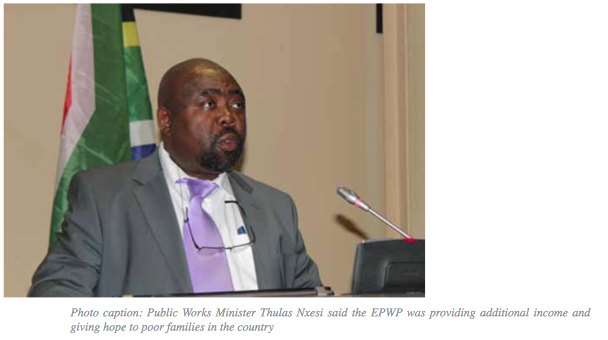 “This represents 55 per cent of the target at the end of the second quarter of the 2012/13 financial year,” said Department of Public Works Deputy Director-General for EPWP Stanley Henderson.
“This represents 55 per cent of the target at the end of the second quarter of the 2012/13 financial year,” said Department of Public Works Deputy Director-General for EPWP Stanley Henderson.
The EPWP is a programme run by the department aimed at providing poverty and income relief through temporary work for the unemployed.
The work opportunities created by the EPWP are combined with training, education or skills development, with the aim of increasing the ability of people to earn an income once they leave the programme.
The department’s target for the second phase of the EPWP is 4.9 million job opportunities by 2014.
Speaking at the 3rd EPWP summit held in Pretoria, which all of the country’s 278 municipalities attended, Henderson said 48 per cent of municipalities had met the targets set for creating job opportunities.
Municipalities in Western Cape and Northern Cape were the top performers when it came to the EPWP targets while municipalities in Limpopo, North West and KwaZulu-Natal fell behind their counterparts.
He said the department planned to improve its working relationship with municipalities to assist those in struggling provinces reach its goals.
Henderson added that those at the summit should work together to make certain that the EPWP changed the lives of people.
The summit gave the department, municipalities and others an opportunity to share best practices in implementing the EPWP.
Progress made since the 2011 summit was also noted.
Acting Chief Director of EPWP Partnership Support Lungisani Dladla said to date 277 of the 278 municipalities had signed the EPWP implementation agreements.
Also, before the 2011 summit only three municipalities had endorsed the EPWP policies but by the time the 2012 summit came along 24 municipalities had endorsed the policies. Minister of Public Works Thulas Nxesi said he was looking forward to the EPWP improving the lives of the poor who depended on the programme.
“The work that we do as a department is very important. We provide employment opportunities to the unemployed. We seek to transfer income directly into poor households and in doing so we bring hope to families. That additional income, small as it may be, goes a long way to support family members. That small income and the training received also provides a gateway to education, training and eventually employment.”
He added that failure was not an option for the department.
“You can see that the EPWP is an exciting place to be. We must feel privileged to be able to contribute in such a concrete way to the empowerment and betterment of our poorest communities. By the same token, it is a heavy responsibility. We dare not fail.”
For more information contact the EPWP on 012 406 1201.
Bursary scheme to help sport, fitness postgraduates
Bursary scheme to help sport, fitness postgraduates sadminA bursary scheme worth R9.74 million has been launched to assist postgraduate students in the sport, recreation and fitness field study towards their PhD or Master’s degrees.
 The scheme - an initiative by Sport and Recreation South Africa (SRSA) and the Culture, Arts, Tourism, Hospitality and Sport Sector Education and Training Authority (CATHSSETA) - will be offered to 30 post- graduate students per year over a period of three years.
The scheme - an initiative by Sport and Recreation South Africa (SRSA) and the Culture, Arts, Tourism, Hospitality and Sport Sector Education and Training Authority (CATHSSETA) - will be offered to 30 post- graduate students per year over a period of three years.
Deputy Minister of Sport and Recreation Gert Oosthuizen said the offer to potential students would include bursaries for 10 PhD and 20 Master’s studies per year over the three-year period.
He explained that the high levels of study were chosen following findings of a research analysis done by the department into the number of registered Master’s and Doctoral students at universities, which offer sport as a learning area.
“The findings are that there are only 267 postgraduate students in sports related studies at these 12 universities,” said the Deputy Minister.
The programme is aimed at addressing the shortage of skills, inadequately qualified individuals, and unemployed graduates in the will assist our sport system to close existing gaps in information and research which can in turn empower our system to address skills development and contribute towards employment creation,” he said.
The department will rely on higher education institutions in South Africa that offer sport, recreation and fitness as a field of study, to identify prospective students to receive the bursary.
Examples of topics that will be considered by the steering committee include:
- The impact of sport on social cohesion.
- The impact of sport on the improvement of the overall academic performance of learners.
- The correlation between winning athletes and a sustainable school sport programme and the position and role of women in sport and recreation.
“This programme will assist SRSA and government … in confronting the challenges of education, skills shortages, research and development as well as the triple challenges of poverty, unemployment and inequality,” said Oosthuizen.
The programme has three key pillars, namely the applied research programme, the action research programme and the postgraduate development programme.
Police beefs up forensic unit
Police beefs up forensic unit sadminThe South African Police Service (SAPS) is boosting its forensic unit through the recruitment of 800 forensic analysts.
Posts for the new batch of analysts have already been advertised and the SAPS is busy processing the applications.
Currently, the country's four forensic science laboratories employ 841 forensic analysts.
The majority, 465, is based in Gauteng, 208 in the Western Cape, 98 in KwaZulu-Natal and 70 in the Eastern Cape.
Minister of Police Nathi Mthethwa recently announced in Parliament that during the 2012/2013 financial year that ends in March, his department would beef up its forensic laboratories section to meet increased demand.
He was responding to a Parliamentary question on how many cases were sent to the SAPS forensic science laboratories since 2009.
In 2009 there were 207 660 entries received by the SAPS forensic science laboratories. In 2010/11 the number of entries received in- creased by 26 per cent to 260 826. The number of entries received in 2011/12 increased by 23 per cent to 320 729.
Between 1 April and 30 September 2012, the laboratories received 209 431 entries, which is a 67 per cent increase in comparison to the same period in the previous year.
Minister Mthethwa noted that over the past few years, there were disappointing reports that delays with forensic evidence had led to courts not being able to finalise cases. The delays were also the reason a number of cases were postponed.
“However we are now beginning to experience a positive turn-around strategy. What becomes important is to ensure that we sustain these best practices, continue to capacitate this division and ensure that it continues to become an additional arsenal in the fight against crime.”
He added that police leadership was encouraged by the progress made so far, noting there had been improved turn around times in the processing forensic case work.
The employment of forensic analysts is also part of the SAPS’s plan to achieve smarter policing and is in line with the process to revamp the criminal justice system.
Minister Mthethwa noted that to secure a conviction there had to be practical evidence because in a court of law, word of mouth did not necessarily guarantee a conviction.
It was vital that evidence presented to court was accurate to help police ensure speedy convictions, he added.
Youngsters show off business skills
Youngsters show off business skills sadminYouth matters
Hundreds of youngsters from across the country displayed their entrepreneurial flair during Global Entrepreneurship Week.
The largest campaign to promote entrepreneurship and entrepreneurial thinking among youngsters took place from 12 to 18 November.
The National Youth Development Agency (NYDA) joined in the campaign, housing entrepreneurial access points at its branches countrywide. Young, innovative and creative thinkers flocked to the branches, which hosted business awareness sessions for high school learners, seminars and presentations for aspiring and established entrepreneurs.
Young entrepreneurs also showcased their products and services, while the NYDA beneficiaries shared their business experiences with other aspiring entrepreneurs.
Since its inception in 2009, the NYDA has disbursed 33 975 loans valued at R97 million to young entrepreneurs. A further 3 932 youngsters are currently involved in the NYDA’s Business Mentorship Programme, with 71 922 having gone through its entrepreneurship training.
Vuk’uzenzele spoke to some outstanding youngsters and beneficiaries of the NYDA programmes who participated in Global Entrepreneurship Week.
Nqubile Nkosi
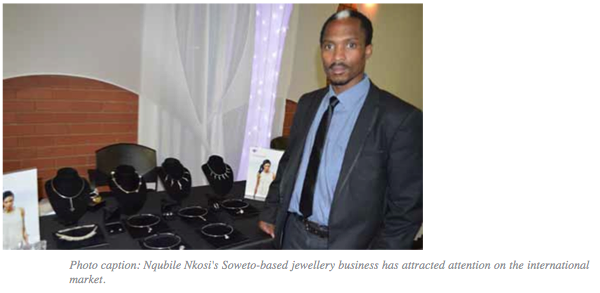 Nkosi is the proud founder of Soweto’s first black-owned jewellery manufacturing and retail business - NQ Jewellery Design Services. Using precious metals such as silver, gold, platinum and diamonds, he designs and manufactures extraordinary jewellery. His talents have also landed him a partnership with Cornerstone Jewellery - a United Kingdom (UK) jewellery brand - a first for a local jewellery designer.
Nkosi is the proud founder of Soweto’s first black-owned jewellery manufacturing and retail business - NQ Jewellery Design Services. Using precious metals such as silver, gold, platinum and diamonds, he designs and manufactures extraordinary jewellery. His talents have also landed him a partnership with Cornerstone Jewellery - a United Kingdom (UK) jewellery brand - a first for a local jewellery designer.
Nkosi’s journey in the industry started in 2007 after he completed an 18-month training course in jewellery manufacturing and design. “I started the business with the seed capital that I made by selling cakes, biscuits and soft drinks on the streets of Soweto,” he says.
With limited funds and equipment, Nkosi repaired and manufactured jewellery on a small scale. He then applied for a business loan from the NYDA, which allowed him to buy additional equipment and material and provided him with working capital.
Today his business has trained and employs four people in the Soweto workshop. Nkosi and his business have received many accolades such as the Gauteng Business Leader of the Year Award in 2008, the Jet Community Regional and National Award in 2009 and the South African Breweries Kick Start Award in 2012. “I also received immense assistance and donations from Paul Purgeon Designs and the British jewellery trade members,” he says.
In 2012 Nqobile and UK designer Paul Spurgeon launched the Cornerstone jewellery brand. The jewellery collection is sold in South Africa and the UK. Nkosi also visited the UK and attended a two-week internship programme where he learnt about all aspects of jewellery production.
Nkosi says the brand is doing extremely well in the UK market and was chosen as one of the 2012 Hot 100 in the UK jewellery trade. However, in order to ensure growth in the South African market, he is keen to partner with prime South African jewellery retailers.
“The African continent has an abundance of natural resources which have for so long supplied the needs of the worldwide jewellery market. Our aim is to take advantage of these resources by training and employing South Africans from disadvantaged communities so that we can alleviate South Africa’s high unemployment levels,” he concludes.
Khulekeni Khanyile
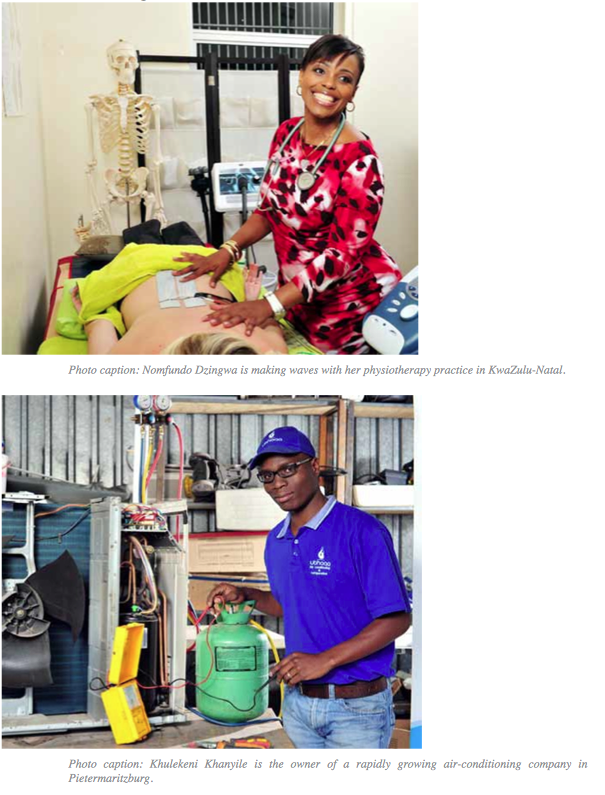 Khulekeni Khanyile is the proud owner of a Pietermaritzburg-based air conditioning company, with a clientele that includes government departments, municipalities and home owners. Defying the misconception that air conditioners are a luxury among black people, Khanyile identified a gap in the market by targeting mainly black home owners. “My aim is to make people understand that air conditioners can be affordable,” he says.
Khulekeni Khanyile is the proud owner of a Pietermaritzburg-based air conditioning company, with a clientele that includes government departments, municipalities and home owners. Defying the misconception that air conditioners are a luxury among black people, Khanyile identified a gap in the market by targeting mainly black home owners. “My aim is to make people understand that air conditioners can be affordable,” he says.
Khanyile studied air conditioning and refrigeration at a further education and training college, before joining a Durban-based air conditioning company and later moved to Pietermaritzburg.
“I studied refrigeration trade theory while working in Pietermaritzburg and fixed people’s fridges and air conditioners in my spare time. However, I was not happy with my growth at the company where I worked and decided to start my own business on a full-time basis,” he says.
It was challenging in the beginning as he relied mostly on work from local municipalities and work was slow coming in.
To boost his business he approached the NYDA for a business loan. “The NYDA firstly assisted me to draft a business plan in 2011 and I then received a R370 000 business loan to import 88 air conditioners from China, buy a bakkie and for marketing material.”
The loan helped him accelerate his business’ growth by targeting black home owners.
Khanyile’s advice to aspiring entrepreneurs is to be passionate about what they do. “You should not expect to get rich overnight be- cause any business has its ups and downs.”
Nomfundo Dzingwa
Nomfundo Dzingwa heads the first black, female-owned physiotherapy practice - Dzingwa Clinic Physio - in KwaZulu-Natal that specialises in gynaecological physiotherapy. In 2010 she acquired a R50 000 business loan from the NYDA, which she used to buy medical equipment and an electrical fence for her practice.
Born, raised and schooled in the township of Umlazi, south of Durban, her journey into the world of physiotherapy started when she obtained a Bachelor of Science degree from the University of Durban-Westville and then an Honours degree in Physiotherapy from the Medical University of South Africa in 2001. She also has a Diploma in Sport Physiotherapy and a Certificate in Orthopaedic Manual Therapy.
This highly ambitious and driven young woman has various achievements under her belt, which includes being part of a team that set up therapeutic rehabilitation facilities at rural hospitals in the country. She has also successfully run physiotherapy practices and served as a health expert on Ukhozi FM’s health show.
Despite her many achievements, Dzingwa is still moving full steam ahead. She is currently in the process of expanding her physiotherapy practice to include an dialysis and renal therapy care centre. “The love and passion that I have for what I do keeps me going when it gets tough,” she explains.
Dzingwa gained valuable experience and knowledge on treating spinal and neural injuries like strokes and chest physiotherapy while being mentored by renowned physiotherapist Melanie Skeen at Meulmed Medi-Clinic in Pretoria. “Some of the valuable lessons that I have learned have been from setbacks and failures. Today I employ five people and with the introduction of the dialysis and renal therapy care centre I will be able to employ four more people.”
Serving on the committee of the Business Women’s Association (BWA) has enabled Dzingwa to network and learn from other businesswomen. “I also enjoy the development work that I do with the BWA. Through our mentorship programme, we expose girls from rural schools to the business world,” she says.
For more information contact the NYDA Call Centre on 0800 525 252.
Gauteng’s top teachers saluted
Gauteng’s top teachers saluted sadminThe Gauteng Department of Education has honoured the province’s top performing teachers, recognising the hardwork they put in to ensure learners’ success.
The provincial Teaching Awards took place recently, with the winners going through to compete at the national event early in 2013.
Teachers were nominated by their schools in various categories.
The awards recognise and promote excellence in teaching performance; honour dedicated, creative and effective teachers and encourage best practice in schools.
Gauteng MEC for Education Barbara Creecy said that teachers were the perfect role models.
The following inspiring teachers scooped these top awards:
Excellence in primary school teaching: Julie-Ann Lendrum of Winchester Ridge Primary
Lendrum started her career as a librarian but switched to teaching after she realised the need to improve language and literacy skills. She now teaches English and life orientation at Winchester Ridge Primary School. Lendrum is also the conductor of her school’s choir.
She believes that by participating in the choir learners can improve their English and become more confident in the language. In the past four years her choir has achieved 100 per cent for their performances at the Alberton Eisteddfod.
Her advice to fellow teachers is to put more effort into their teaching to get positive results out of learners.
Excellence in secondary school teaching: Shape Msiza of Ponelopele Oracle Secondary
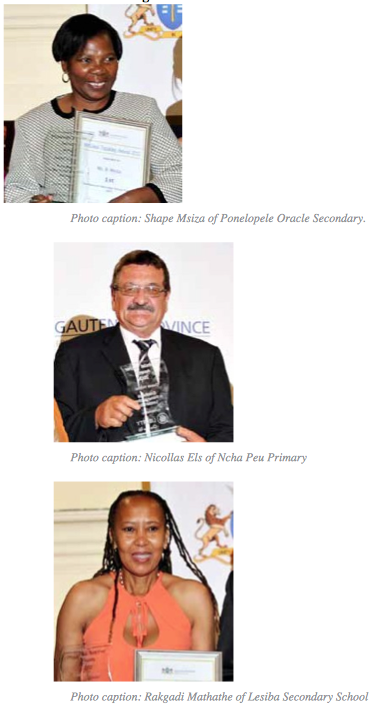 Msiza has brought sporting and academic success to the recently opened Ponelopele Oracle Secondary School in Ivory Park. She has ensured a 100 per cent pass rate in Grade 12 English for most of the years she has been teaching at the school.
Msiza has brought sporting and academic success to the recently opened Ponelopele Oracle Secondary School in Ivory Park. She has ensured a 100 per cent pass rate in Grade 12 English for most of the years she has been teaching at the school.
In 2009 she received her school’s Best Teacher of the Year award and in 2008 received the Best Sports Administrator award. Msiza is passionate about sports and has served as a technical athletic officer for Athletics South Africa. She was the chairperson for athletics committee of the Johannesburg East District from 2008 to 2010.
Excellence in primary school leadership: Nicollas Els of Ncha Peu Primary
Els believes that teaching is his divine calling. He enjoys working with children and has been involved in teaching for the past 26 years, 22 of those as a principal. The highlight of his career was being promoted to principal after just four years in teaching. Els has been the principal of Ncha Peu Primary in Soshanguve since 2000 and also teaches life sciences. His message to other teachers is that success is possible through hard work, commitment and a positive attitude.
Excellence in secondary school leadership: Rakgadi Mathathe of Lesiba Secondary School
Mathathe is the principal of Lesiba Secondary School in Daveyton. For past 23 years she has been working with young people to assist them realise their potential. Her passion for human development drove her to study teaching. Mathathe started her career as a physical education teacher and earned the principal’s post because of her commitment to her work.
Mathathe takes pride in the success of her learners. The Grade 12 learners have her cell- phone number so that they can call her at any time for advice. She encourages teachers at her school to take learners under their wing.
“We do this in order to mentor and impart positive messages to our learners so that they can be responsible citizens. For us teaching is not only our job but also a calling to enhance human development,” Mathathe said.
Excellence in Grade R teaching: Paula Pretorius of Laerskool Pierneef
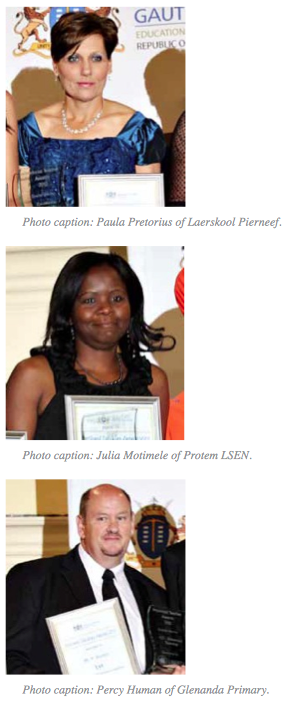 It did not come as a surprise to many when Pretorius became a teacher. Her patience, passion and love for children make her the outstanding teacher she is today.
It did not come as a surprise to many when Pretorius became a teacher. Her patience, passion and love for children make her the outstanding teacher she is today.
After obtaining two education related degrees at the University of Pretoria, Pretorius embarked on a 20 year teaching career. She teaches Grade R learners at Laerskool Pierneef in Pretoria. Pretorius said the years she had spent teaching have been the best of her life.
“I have seen thousands of learners progressing to Grade R with confidence and that fulfils my dreams. They leave Grade R emotionally stable and school-ready, that in itself makes me proud of my work as an educator. I will forever cherish those moments,” said Paula.
Her advice to parents is to support their children at all times. “Never neglect the developmental needs of your child. Assist them to reach their goals,” she said.
Excellence in special needs teaching: Julia Motimele of Protem LSEN
Motimele started teaching technical engineering at Tshwane South College while she was still a student. This is where she developed a passion for teaching.
After completing her qualification in engineering she enrolled for a postgraduate Certificate in Education. She has been a teacher for nine years and is currently teaching at Protem LSEN. She has an Honours degree in Education Management. Motimele always thought of herself as shy but her experience in teaching has proven otherwise. She believes that teaching has enhanced her public speaking and interpersonal skills. Motimele plays an active role in her school by organising events, as well as HIV and crime awareness campaigns. She also coaches volleyball and coordinates cultural activities.
Excellence in ICT-enhanced teaching: Percy and Wayne Human of Glenanda Primary
This father and son team has taken the world of information communication technology (ICT) to the classroom.
Percy has 28 years of teaching behind him. With siblings and two children that are also teachers he says that teaching is the family business. He teaches social sciences, Afrikaans additional language and life orientation while his son Wayne teaches ICT to Grades 3 and 4. Wayne’s teaching career started in 2003 and he has never looked back. “It’s wonderful to teach children ICT for the first time and to know that you are equipping them for life since technol- ogy is the future,” he said.
Percy and Wayne have adopted the Tiisetso Bekezela Primary in Weiler Farm and provide free ICT lessons to the learners. In addition, they provide food, stationery and transport for the learners to attend school. They also lead the partnership between their school with the 2nd Global Partners Junior in New York. This ICT collaboration enables learners from around the world to share ideas with their peers.
Lifetime Achievement Award: Bilkes Vawda of Marlboro Gardens Secondary
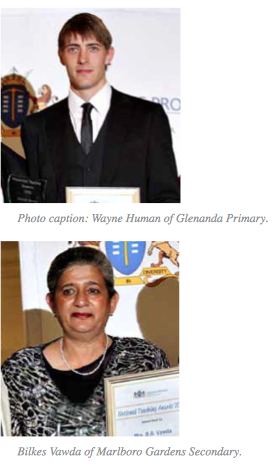 Vawda left KwaZulu-Natal in 1965 to study law but she stood in the wrong queue and registered for teaching instead. She has been teaching for 39 years and is the principal of Marlboro Gardens Combined School. Her school caters for learners from Grade R to 12. Originally the school catered for Indian learners but has since transformed into a multi-cultural institution.
Vawda left KwaZulu-Natal in 1965 to study law but she stood in the wrong queue and registered for teaching instead. She has been teaching for 39 years and is the principal of Marlboro Gardens Combined School. Her school caters for learners from Grade R to 12. Originally the school catered for Indian learners but has since transformed into a multi-cultural institution.
“We grew from only 400 Indian learners to a staggering 1 300 learners who represent our diversity. We have boldly embraced transformation,” she said. The school achieved a 100 per cent matric pass rate. In October 2004, the Japanese government helped the school open a fully equipped computer centre. Vawda drove the partnership.
“I wish my school was big enough. My heart sinks with sadness whenever we have to send back numbers of potential learners because we have limited space available,” she said.
Kader Asmal Excellence Award: Lefa Mohapi of Tsolo Secondary School
Mohapi, the principal of Tsolo Secondary in Vanderbijlpark since 2009, has previously won the Gauteng Provincial Teacher Awards category of Excellence in Secondary School Leadership. Mohapi has 27 years teaching experience.
His school in the Bophelong informal settlement boasts 59 staff and 1 463 learners.
His passion for education has seen him receive a number accolades including being a guest at the official opening of Parliament in 2010.
“I am an agent of change. I lead with the eight Batho Pele principles,” Mohapi said. Tsolo Secondary was once an underperforming school but under Mohapi’s leadership has turned over a new leaf and recorded a 76.7 per cent pass rate.
Start the new year financially wise
Start the new year financially wise sadminA new year has dawned on us. Some of us were caught up in the moment and spent recklessly on items we don’t re- ally need. But not all is gloom and doom as we are still employed and have a second chance to get it right.
I am very sceptical about new year’s resolutions. I never set them so I never fail to live up to them. What I do believe in is good routines that last throughout the year. For this reason, I've made it a habit to review my financial responsibilities at least once a year. With that in mind, here are seven things you can do today to set yourself up to be more financially prepared and prosperous in 2013.
1. Write down your financial goals.
It's hard to make financial decisions without having goals to guide you. Having a written financial plan can help you stick to those goals. Like anything else, if it's thought about that's a start. If you take some action on something that's better but if it's written down and you're holding yourself accountable, it takes it one level further. If you already have a plan, great, but goals change as you age and as your life changes so you need to review them regularly.
2. Organise your spending. Create a budget.
A budget is a big part of financial planning and keeps you on track to meet your goals so write down your income and realistic expenses and stick to it. We tend to exclude the small items like daily bread, spending for kids and lunch at work. This should be part of your expenses as it all adds up.
3. Check your credit report.
Your credit report is more than just a history of your account payments. It can provide you with an early warning signal that something is not right. Every South African is entitled to one free credit bureaus report. You can contact Experian on 0861 105 665 for your free credit bureaus report. Even if you're not concerned about your score, you'll want to ensure that accounts that should have been closed were, nothing is on there that shouldn't be and to look at the inquiries on your report. Are there any loans or credit cards listed that you didn't apply for?
4. Cut your fees.
Draw a full bank statement and check all fees from your account. You might be paying fees or insurance for an account that has been paid up long ago.
5. Review your will.
While you likely won't need to change your will every year, you should at least look it over and ask yourself whether it still reflects your wishes. Think about whether you have experienced any life-changing events such as a marriage, separation or the birth of a child.
All of this should be reflected in your will. Also review who you have appointed as your executor, power of attorney, beneficiaries and guardian of your children. Perhaps key players have changed. Whatever you do, don't try to change your will by writing on it - the changes won't be legally binding.
6. Review your insurance cover.
Start with property insurance. If you've acquired anything valuable since your last review, it likely isn't covered by your existing policy so make a detailed inventory for your insurer. Also, be sure to notify your insurer if you've made any major renovations that will affect the value of your home. And don't forget to review your life and disability insurance. Ask yourself whether anything has changed in the past year that affects your coverage needs.
7. Be grateful.
Make time to be grateful for all we have, all we wish to have and all we shall never have.
Have blessed 2013.
Marilyn Williams is a registered debt Counsellor 0861 777 29
Customer Care Centre gives residents reason to smile
Customer Care Centre gives residents reason to smile sadminThe Eastern Cape Department of Transport Customer Care Centre (CCC) has continued with its impressive resolution of Presidential Hotline enquiries.
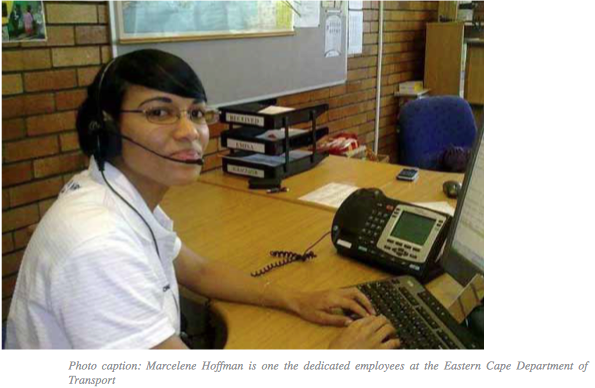 According to a report released by the Presidency, by the end of October 2012 the call centre had resolved 63.3 per cent of enquiries received.
According to a report released by the Presidency, by the end of October 2012 the call centre had resolved 63.3 per cent of enquiries received.
Nomfusi Telma Nonwana is one of the many the CCC has helped.
“Through this customer care number, I was able to receive my pension fund which I was owed by the same department for the years I worked there from 1979 to 1983. I am very happy and appreciate the manner in which my complaint was handled by the Presidential Hotline,” she said.
Another case is that of Pine Pienaar who is a member of the Provincial Legislature and DA shadow MEC for Roads and Public Works in Bhisho.
He contacted the call centre after he received a call from his colleague at the legislature, Veliswa Mvenya, who was lost on a dirt road between Port Elizabeth and East London at 5:15am on a Sunday.
The operator immediately contacted her and directed her to the main road.
The operator then called Pienaar to tell him that Mvenya was safely on her way home.
“This excellent service on a Sunday, at such an hour, must be acknowledged and applauded. Well done to the department and the call centre,” said Pienaar.
Lindile Mfazwe of Arah Soccer Academy in Mdantsane also expressed his appreciation for the assistance he received.
He had requested help with funding for transport and a new kit.
“We were afforded the opportunity to make a presentation on what we needed help with. As a result of a meeting which was set-up between ourselves and the department’s Special Programmes Unit and we also got regular call backs to be updated on the status of our case,” said Mfazwe.
The CCC was established to handle enquiries received by the department and its staff members were educated on the department’s functions.
The centre currently has dedicated two officials to specifically work on Presidential Hotline calls for proper resolution and monitoring. Each week, a day is dedicated to focus on Presidential Hotline enquiries.
The CCC number is 0800 644 644.
* Ncedo Kumbaca works for the Eastern Cape Department of Transport.
New centre brings energy to Imzizi’s doorstep
New centre brings energy to Imzizi’s doorstep sadminResidents of the Imzizi Administrative Area in the Eastern Cape no longer have to travel 15km to buy paraffi or to refill their gas cylinders.
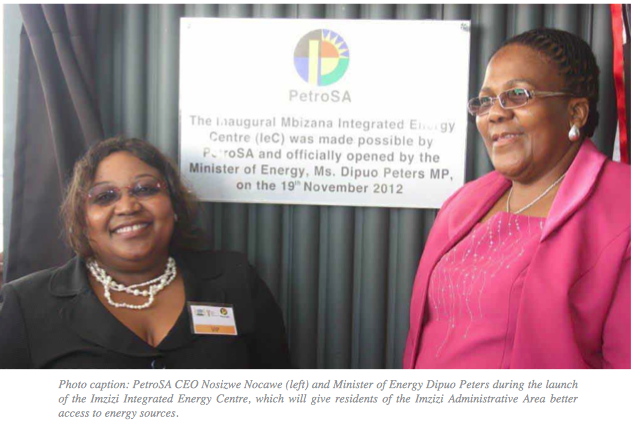 An Integrated Energy Centre (IeC) built in the area has brought energy sources to their doorsteps, making life easier for the community.
An Integrated Energy Centre (IeC) built in the area has brought energy sources to their doorsteps, making life easier for the community.
At the IeC, residents can buy safe and sustainable energy, while also getting information on how to use illuminating paraffin and liquefied petroleum gas.
Before the IeC was established residents had to travel to the town of Mbizana to buy these energy sources.
The centre is one of the Department of Energy’s projects aimed at providing energy solutions to rural areas that do not have electricity. The department started the IeC project in 2002 to promote access to clean and affordable energy services.
Nine IeCs have been built in the Eastern Cape, Northern Cape, KwaZulu-Natal, Limpopo and North West. This was done in partnership with municipalities, development agencies and oil companies.
The Imzizi IeC is a partnership between the Mbizana Municipality, the department and state owned oil company PetroSA.The petrol station at the IeC is the first retail service station in the country under the PetroSA flag.
Construction of the Imzizi IeC cost about R12 million.
The centre consists of a convenience store, a car wash, tyre repair, petrol station, public phones and bank facilities.
Minister of Energy Dipuo Peters launched the centre in November 2012.
“A total of 61 jobs were created during the construction period and a further 10 permanent jobs to operate the business. There is no doubt that the car wash and other small, medium and micro enterprises will create additional job opportunities,” said Minister Peters.
Not only is the IeC a source of clean and reliable energy, it is also project for the people and will be run by the community.
Community members are not just consumers but have registered a community cooperative to run the business.
At the end of the financial year, a certain percentage of the profits from the IeC will ploughed back into the community’s trust fund. The cooperative is made up of 39 members, including 19 females and 20 males. Nine of the
39 are young people.
Minister Peters explained that the IeC site had a convenience shop, training centre and underground tanks to hold 23 000 litres unleaded petrol, 23 000 litres of diesel, 11 000 litres of lead replacement petrol and 11 000 litres of illuminating paraffin.
She urged the community to guard the centre against vandalism, theft and any form of abuse. “The cooperative should never forget that they remain accountable to the community as this service point has been created for the benefit of the local people,” the Minister pointed out.
The Eastern Cape has a backlog in electricity connections for houses of 437 874 and 20 333 of these are in Mbizana Local Municipality where Imzizi is situated.
“The municipality was allocated funds to ad- dress their network conditions. The allocation for the 2013/14 financial year will give us 1 334 new connections. This will not be done as the municipality is still busy with backlog of the 2011/12 projects,” Minister Peters said.
The department was in discussion with Eskom to make electricity available to municipalities that fall under the Eskom supply.
For more information contact the Department of Energy on 012 406 7300 or email: info@energy.gov.za
SA to score big with BRICS development bank
SA to score big with BRICS development bank sadminInternational relations
BRICS development bank can help create jobs in South Africa and pro- mote greater trade on the continent by funding new infrastructure, say emerging markets analysts.
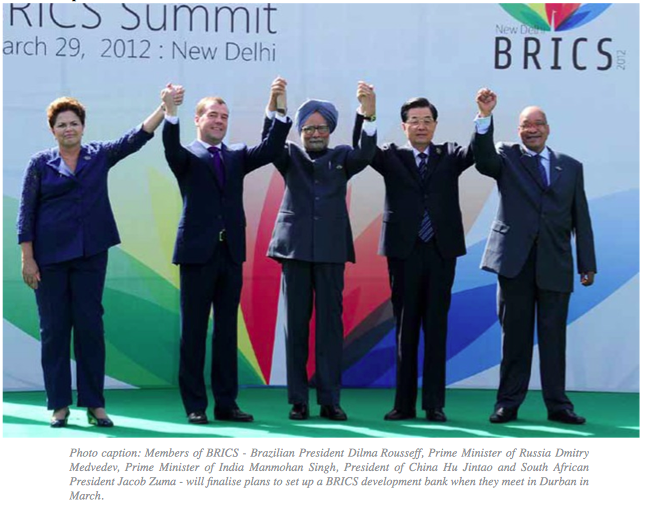 The BRICS countries - Brazil, Russia, India, China and South Africa - plan to finalise the setting up of a BRICS development bank at the next BRICS summit to be held in Durban in March 2013.
The BRICS countries - Brazil, Russia, India, China and South Africa - plan to finalise the setting up of a BRICS development bank at the next BRICS summit to be held in Durban in March 2013.
This comes after the leaders of the five countries considered a proposal at the last summit in New Delhi to set up the development bank, funded and managed by the BRICS and other developing countries.
The finance ministries from the five member countries are now working on a business plan for the development bank.
University of Pretoria international political economy senior lecturer Dr Mzukisi Qobo said the development bank could help fund the roll out of infrastructure on the African continent. He pointed out that appetite for investing in Africa was growing, with China, India and Gulf countries all interested in investing.
However investment was still held back by a lack of adequate infrastructure in Africa.
A 2009 report by the World Bank estimated that Africa would need about $93 billion (R809 billion) a year to replace and build new infra- structure on the continent.
Qobo said setting up a BRICS development bank could also create more jobs in South Africa, as companies from BRICS member states would be keen to base themselves in the country to source goods from the rest of the continent. Improved infrastructure could also lead to more business for South African companies in the rest of Africa.
He said the development bank would likely supplement existing efforts of multilateral and regional financial institutions for global growth and development.
Martyn Davies, the chief executive of Frontier Advisory, said the development bank could boost regional development in Africa. The bank could also act as an emerging market counter- weight to the International Monetary Fund.
Davies said a fi e of $240 billion (R2 trillion) had emerged in relation to the size of the initial funding pool available to the development bank. He said in setting up the bank, BRICS members are likely to mimic the example of the Chinese Development Bank, one of the world’s largest development banks.
The challenge, he said, would be to manage political relations between BRICS member countries when it came to running the development bank. The Deputy Minister of Inter- national Relations and Cooperation, Marius Fransman, said late in 2012 that a BRICS development bank would provide “a major boost” to the South African government development needs.
Deputy Minister Fransman said his department is also considering setting up a BRICS think-tank to look at diplomatic and economic opportunities between South Africa and its BRICS partners.
He listed the three main objectives that South Africa seeks to achieve from its membership of BRICS as:
- Boosting job creation and the domestic economy.
- Supporting African infrastructure development and industrial development.
- Partnering with South partners to revamp world governance organisations such as the United Nations Security Council.
When it came to boosting its position in BRICS, South Africa, he said, needed to look beyond its population of 51.7 million and at how it could position itself on a continent of one billion people that is fast rising economically.
The rationale for South Africa’s involvement in BRICS should be in how it can link the Afri- can continent with the other BRICS members, he said.
Deputy Minister Fransman said South Africa’s overall trade with BRICS countries had more than doubled from $9.2 billion (R80 billion) in 2005 to $20.4 billion (R177 billion) in 2010. Africa’s trade with BRICS countries is expected to reach one third of total trade on the continent in 2015, up from one fifth of total trade in 2010.
SA crafters a hit in India
SA crafters a hit in India sadminInternational relations
Thirty-three South African business people in the arts and crafts sector got an opportunity to showcase their products to the international market.
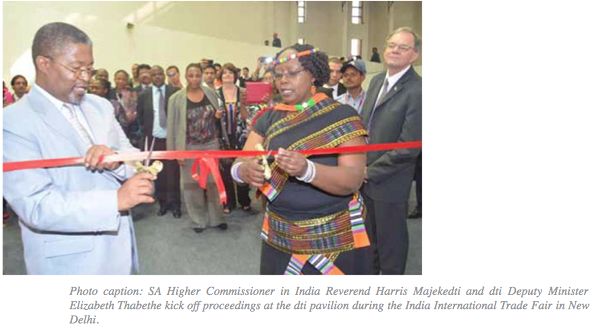 They participated in the 32nd India Inter- national Trade Fair (IITF) held in New Delhi, India recently.
They participated in the 32nd India Inter- national Trade Fair (IITF) held in New Delhi, India recently.
The group’s participation in the internationally acclaimed exhibition was made possible by the Department of Trade and Industry (dti), through its Export Marketing and Investment Assistance.
The scheme is aimed at developing export markets for South African products and services and recruiting new foreign direct investment into the country.
The IITF is one of the largest integrated trade fairs of exhibitor and visitor participation, targeting both trade visitors and the public. Participants were given the chance to showcase their products and services, which included leather, textiles, handicrafts, jewellery, furniture and furnishings. More than 7 000 exhibitors from across the world participated in the fair.
dti Deputy Minister Elizabeth Thabethe said the crafters the department selected had the opportunity to market and showcase their products on a world stage.
South Africa first participated in the IITF in 2008 and the positive feedback encouraged the dti to send more business people to display their products and market them internationally. The crafters were identified at the South African Handmade Collection, a unique and proudly South African craft brand that promotes South African handmade products nationally and internationally. The group pro- motes emerging craft enterprises, especially those from rural areas.
South African crafts proved to be a great hit with the international market with products flying off the shelves within minutes of the exhibition beginning. Almost all the local crafters recorded unexpectedly high volumes of sales.
One of them was Julia Kunstler from Johannesburg. “The first stock of products I packed was sold out on the first day and I had to pack more. I brought 30 boxes of hand-painted ceramic products weighing 500kg. My dinner sets were the most popular with the people who are visiting my stand,” she said.
Cilo Mdagane of Sebokeng, Gauteng said four of his most expensive classic wire cars were sold in the first two days. To make sure that he didn’t run out of stock, he worked through the night to create more beaded wire cars and lizards.
On the very first day of the IITF a business- man walked up to KwaZulu-Natal’s Jabulani Mhlambini’s stand and bought a sizeable number of ceramic dishes, bowls and trays.
Grace Ngobeni of Limpopo said her traditional beaded dolls, necklaces and bags caught the imagination of visitors who cleaned out her first batch of stock. “Fortunately, I brought enough stock and managed to replenish my stand regularly,” said Ngobeni.
Aaron Ndaba of Riverlea, Gauteng also tasted success, selling 75 of his pendants, which were made of polyester thread in the first two days of the exhibition. “I have also been fortunate that instead of worrying about returning home with unsold stock, I clinched a deal with one of the visitors who came here on the penultimate day of the fair and bought all of the stock that was left,” said Ndaba.
The South African exhibitors said they were happy to make good sales at the exhibition even though their major objective was to get big, long-term orders. This would enable them to create jobs for people who would be required to service the orders.
* Bongani Lukhele works for the dti.
Fan parks bring AFCON to football lovers’ doorsteps
Fan parks bring AFCON to football lovers’ doorsteps sadminSport
Soccer fans who cannot make it to the stadium to watch matches live during the 2013 Orange Africa Cup of Nations (AFCON) need not despair.
 They will not have to miss out on any of the action and have the option of watching the matches in the electrifying atmosphere of fan parks or public viewing areas that will be set up during the tournament.
They will not have to miss out on any of the action and have the option of watching the matches in the electrifying atmosphere of fan parks or public viewing areas that will be set up during the tournament.
Following the success of the fan parks in both the 2006 FIFA World Cup in Germany and the 2010 edition in South Africa, they will once again make an appearance during AFCON 2013.
The tournament will be hosted across five South African cities where Africa’s top 16 football nations will battle it out for the coveted trophy and bragging rights of being the best on the continent.
The focal points of each fan park are the big screens where fans can watch games and enjoy the activities organised by the municipalities.
In Gauteng, football fans will have a choice between three official public viewing areas in Ivory Park, Diepsloot Park and Orange Farm Park. Gauteng residents will also be able to watch the matches at parks where screens will be put up, said Thembelihle Radebe from the City of Johannesburg.
“Those screens will be switched on for the duration of AFCON to afford residents from those areas to view AFCON games without having to be at an official fan park,” she said. These will be at Diepkloof Park, Diepsloot Park, Eldorado Park, Ivory Park, Joubert Park, Lenasia, Orange Farm, Orlando West, Thokoza Park.
Radebe said discussions were also taking place with private companies that want to develop villages in line with countries such as the Nigeria Village.
“The idea of these villages is to provide soccer related entertainment and excitement and to have big screens for showing the matches.”
Football fans in Mpumalanga can also watch the games at Ga-More Stadium in the JS Moroka Local Municipality and Mkhuhlu Stadium in Bushbuckridge.
While fans are out enjoying the games, police will be hard at work to ensure an incident free tournament.
Deputy Minister of Police Maggie Sotyu said government would go all out to ensure that the tournament is safe and secure.
“Security will be provided to all the participating teams including Bafana Bafana, 24/7. We will strengthen security at all ports of entry during this period, especially our borders, airports, seaports and land ports of entry.”
She added that police would escort all participating teams from their hotels to the games and training grounds.
SA’s sporting pride honoured at awards
SA’s sporting pride honoured at awards sadminSport
The country’s sport stars received much deserved recognition for their thrilling talent with the top achievers rewarded at the South African Sports Awards.
“It was a night that truly honoured our sporting greats, up-and-coming talent and the federations, schools and administrators that turn our youth into future sports stars. Our sporting heroes are our nation's pride,” said the Minister of Sports and Recreation, Fikile Mbalula, after the recent awards in Sandton.
The country’s sports stars had made South Africa proud, he added.
“They continually represent our country at an extremely high level, and they are some of our best ambassadors. At the SA Sports Awards we honoured all the sports stars big and small the way they deserve to be honoured - as stars.”
The event was a collaboration between Sports and Recreation South Africa, the South African Sports Confederation and Olympic Committee, the SABC and the Gauteng Department of Sport, Arts and Culture. The grand total in prize money - a staggering R3.7 million - was split among the winners in each category. All nominees received R10 000.
The coveted title of Sports Star of the Year, as voted for by the public, went to Olympic medallist and swimmer Chad le Clos. He walked away with R1 million in prize money and a new BMW.
“Chad has not only won the hearts of South Africans but those of millions around the globe. His achievements at the Olympics have catapulted him onto the world stage,” remarked Minister Mbalula.
 Other winners included:
Other winners included:
- Sportsman of the Year - Proteas fast bowler Vernon Philander.
- Sportsman of the Year with a Disability - Oscar Pistorius, who made history in 2012 by becoming the first double amputee to compete in both the Olympics and Paralympics.
- Sportswoman of the Year with a Disability - recently retired swimming sensation Natalie du Toit.
- Sportswoman of the Year - the queen of the track Caster Semenya.
- Newcomer of the Year - up-and-coming rugby star Siyamthanda Kolisi.
- Team of the Year - the South African rowing team, affectionately known as the Awesome Foursome.
- Coach of the Year - Joseph Mkhonza of Banyana Banyana.
- School Team of the Year - Ithembelihle Comprehensive School for Rugby.
- Developing School Team of the Year - Nkunzimbini Junior Secondary School for football.
The Steve Tshwete Lifetime Award 2012 winners were:
- Elijah Tap Tap Makhithini (boxing);
- Papwa Sewgolum Sewsunker (golf);
- Sam Ramsamy;
- Petros Molemela (football);
- Sally Little (golf);
- Joost van der Westhuizen (rugby).
Green Jacket recipients for 2012:
- Nelson Teenage Dladla (football);
- Matthews Motshwarateu and Blanche Moila (athletics)
- Grant Khomo (cricket, rugby, football and tennis) was bestowed with the Order of Ikhamanga.
